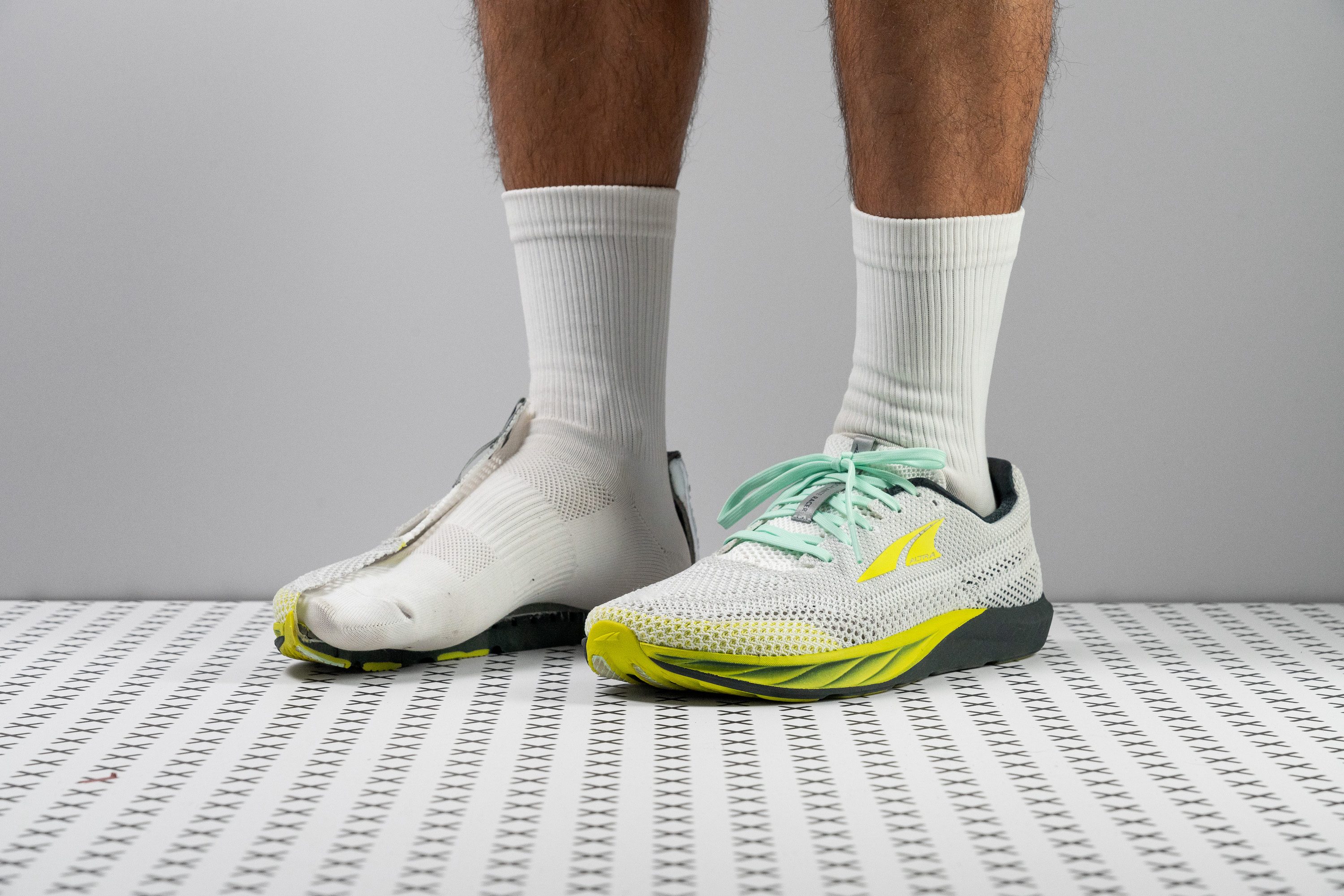Our verdict
- Top pick in best Altra running shoes
- Top pick in best low drop running shoes
Pros
- Enhanced toebox and outsole durability
- Incredible ventilation
- Grounded yet cushioned feel
- True zero-drop experience
- Spacious, foot-shaped toebox
- Superb stability
- Highly durable knit
- Premium perforated insole
Cons
- Heavier than previous version
- Lacks heel padding durability
Audience verdict
- Top 29% in Altra running shoes
Comparison
The most similar running shoes compared
+ + Add a shoe | |||||
|---|---|---|---|---|---|
| Audience score | 88 Great! | 90 Superb! | 84 Good! | 89 Great! | |
| Price | £125 | £110 | £135 | £140 | |
| Pace | CompetitionTempo | Daily runningTempo | Daily runningTempo | Daily runningTempo | |
| Shock absorption | - | High | Moderate | Low | |
| Energy return | - | Moderate | Low | Low | |
| Traction | - | High | High | Moderate | |
| Arch support | Neutral | Neutral | Neutral | Neutral | |
| Weight lab Weight brand | 7.9 oz / 224g 7.9 oz / 224g | 8.6 oz / 245g 8.4 oz / 238g | 7.7 oz / 217g 7.6 oz / 215g | 8.5 oz / 240g 8.1 oz / 229g | |
| Lightweight | ✓ | ✓ | ✓ | ✓ | |
| Drop lab Drop brand | 1.1 mm 0.0 mm | 8.2 mm 9.0 mm | 5.9 mm 5.0 mm | 10.1 mm 6.0 mm | |
| Strike pattern | Mid/forefoot | HeelMid/forefoot | Mid/forefoot | Heel | |
| Size | True to size | Half size small | Half size small | True to size | |
| Midsole softness | Balanced | Balanced | Soft | Firm | |
| Difference in midsole softness in cold | Normal | Small | Small | Small | |
| Toebox durability | Good | Bad | Bad | Decent | |
| Heel padding durability | Decent | Good | Good | Bad | |
| Outsole durability | Good | Decent | Decent | Good | |
| Breathability | Breathable | Breathable | Breathable | Moderate | |
| Width / fit | Wide | Wide | Wide | Medium | |
| Toebox width | Wide | Medium | Wide | Wide | |
| Stiffness | Moderate | Moderate | Moderate | Moderate | |
| Torsional rigidity | Flexible | Moderate | Stiff | Flexible | |
| Heel counter stiffness | Flexible | Flexible | Moderate | Flexible | |
| Heel lab Heel brand | 22.5 mm 24.0 mm | 34.9 mm 35.0 mm | 32.8 mm 34.5 mm | 27.9 mm 28.0 mm | |
| Forefoot lab Forefoot brand | 21.4 mm 24.0 mm | 26.7 mm 26.0 mm | 26.9 mm 29.5 mm | 17.8 mm 22.0 mm | |
| Widths available | Normal | NormalWide | Normal | Normal | |
| Orthotic friendly | ✓ | ✓ | ✓ | ✓ | |
| Season | SummerAll seasons | SummerAll seasons | SummerAll seasons | All seasons | |
| Removable insole | ✓ | ✓ | ✓ | ✓ | |
| Ranking | #142 Top 37% | #45 Top 12% | #253 Bottom 34% | #88 Top 23% | |
| Popularity | #243 Bottom 36% | #182 Top 48% | #136 Top 36% | #102 Top 27% |
Who should buy
Here in the lab, we think the Altra Escalante Racer 2 is an outstanding choice for:
- Zero-drop enthusiasts seeking a fast, nimble, and agile running shoe.
- Runners that want a minimalist shoe that's ideal for tempo efforts and short 5K/10K races.
- Loyal fans of the previous Escalante Racer who value improved outsole durability—this version addresses that flaw effectively.
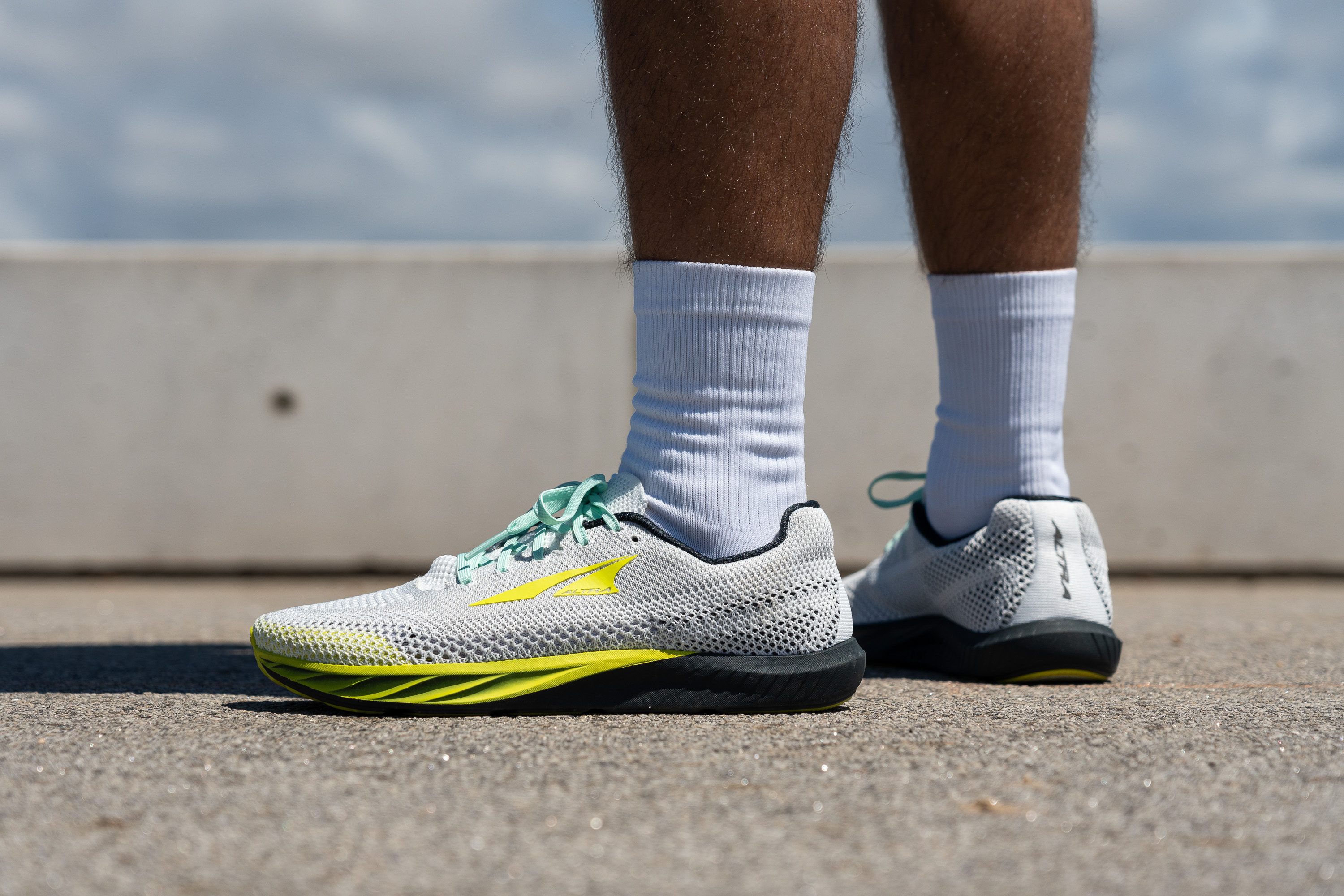
Who should NOT buy
We really liked the massively ventilated, engineered-knit upper of the Escalante Racer 2, but we believe it's not the best choice for runners who frequently tackle cold temperatures—it barely retains any heat and quickly dissipates it.
For those in cooler climates, we think there are better options, such as the Altra Escalante 4, which offers a thicker and denser knit without sacrificing the Escalante DNA.
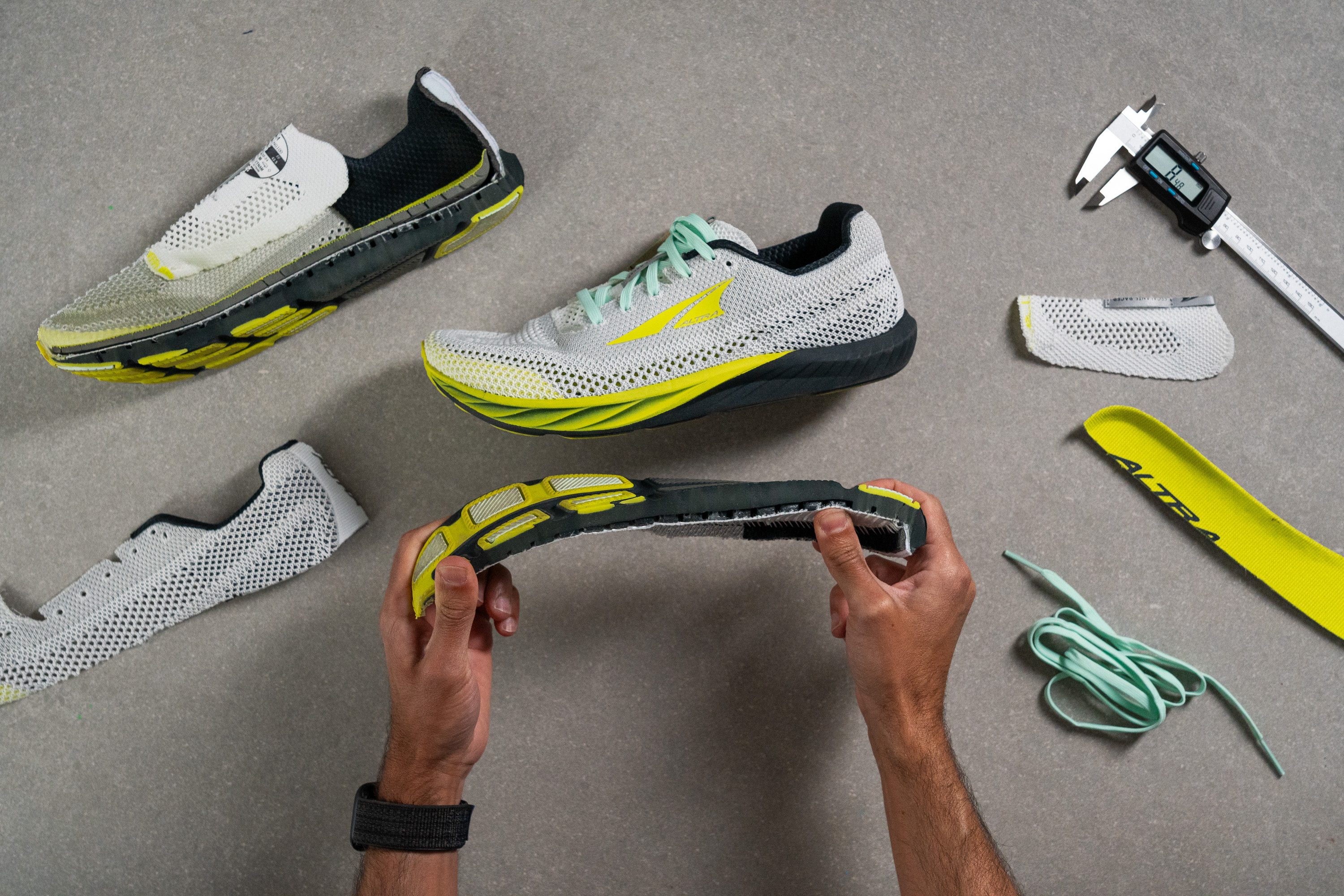
Additionally, we do not recommend the Escalante Racer 2 for heavier runners due to its low cushioning. For those needing a bit more foam underfoot while still enjoying a zero-drop platform, we suggest the Altra Torin 7, or for those who strike with their heels and prefer a medium 4-mm offset, the Saucony Kinvara 14 might be a better fit.
Cushioning
Heel stack
We previously mentioned that the Escalante Racer 2 features a low-stack midsole, and now it's time to delve into specifics.
Starting with the heel, we measured a notably low 22.5 mm, which, coupled with its zero drop, likely makes this shoe less appealing for rearfoot strikers.
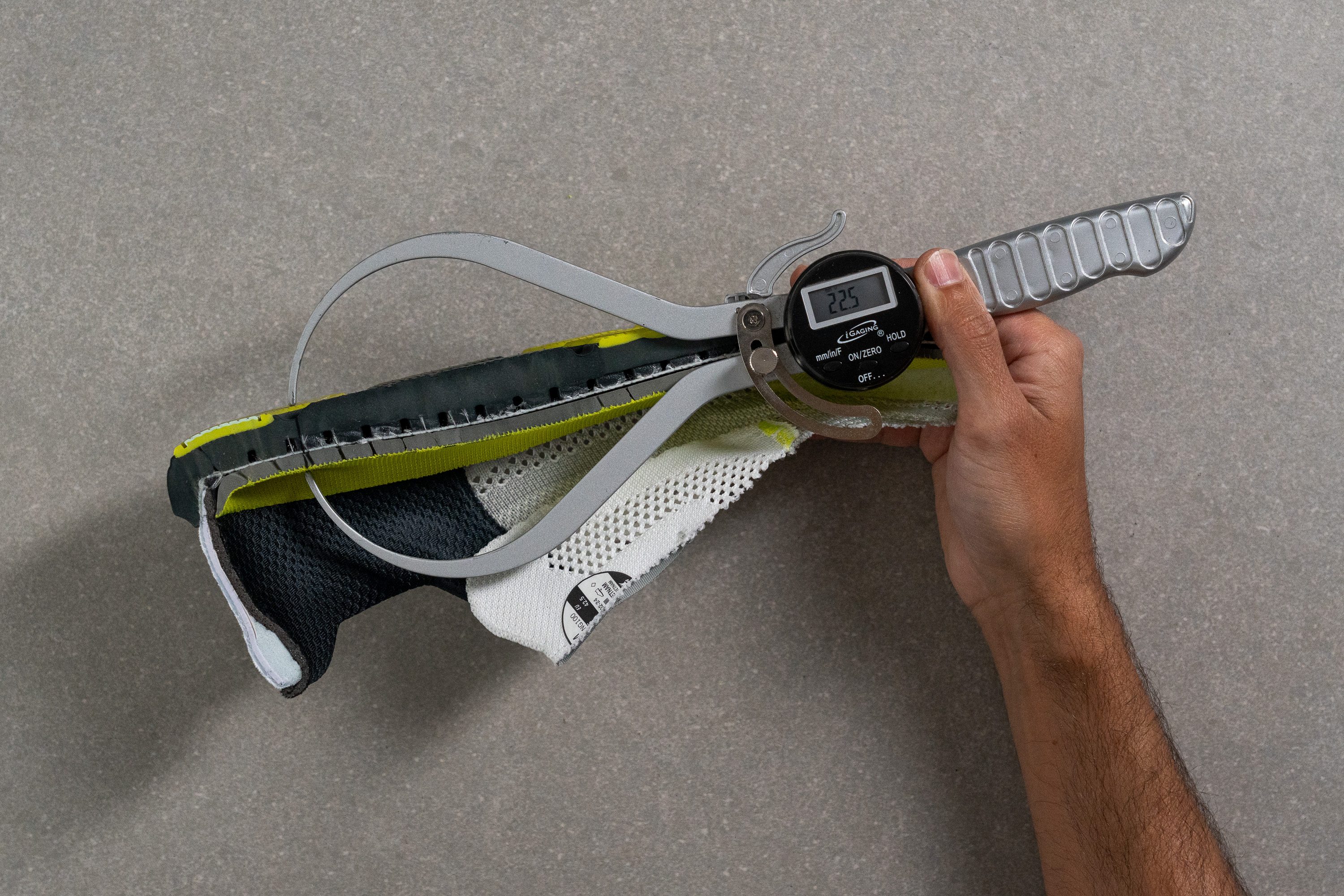
| Escalante Racer 2 | 22.5 mm |
| Average | 34.8 mm |
Forefoot stack
The forefoot of the Escalante Racer 2 maintains a similar thickness at 21.4 mm. Our perspective is that it's ideal for those seeking a ride that offers some decent cushioning yet still provides a strong ground feel.
We also discovered that the reason for the weight gain is the increased stack height, which has grown over 3 mm compared to our measurements of the previous version. Is the change worthwhile? Well, that depends on your weight vs. cushioning preferences!
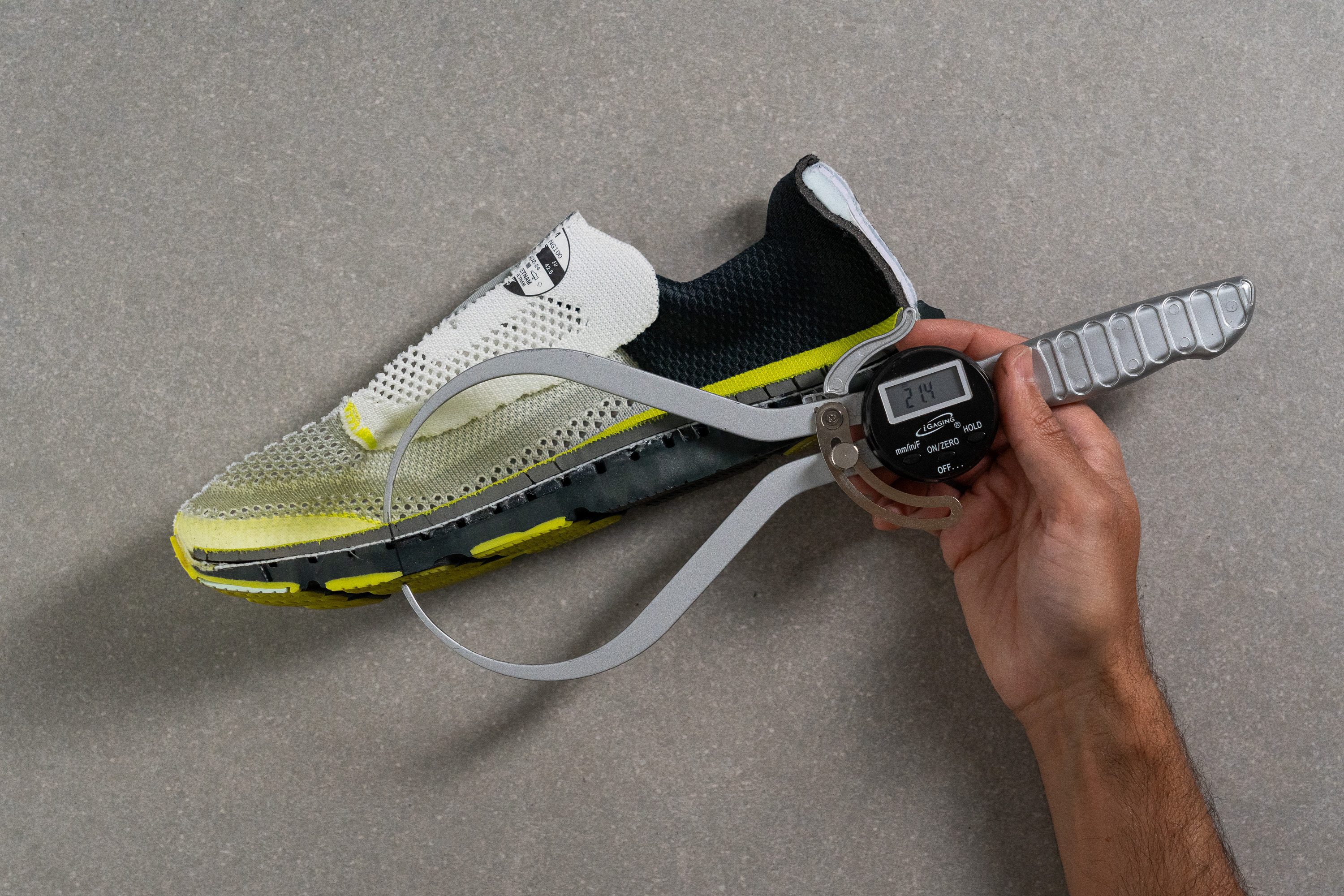
| Escalante Racer 2 | 21.4 mm |
| Average | 26.2 mm |
Drop
We observed a minimal 1.1 mm difference in height from heel to toe, positioning this as a true zero-drop shoe.
While it doesn’t achieve an exact 0 mm drop, this is practically normal for any running shoe, as we often find larger deviations from the brand-stated drop.
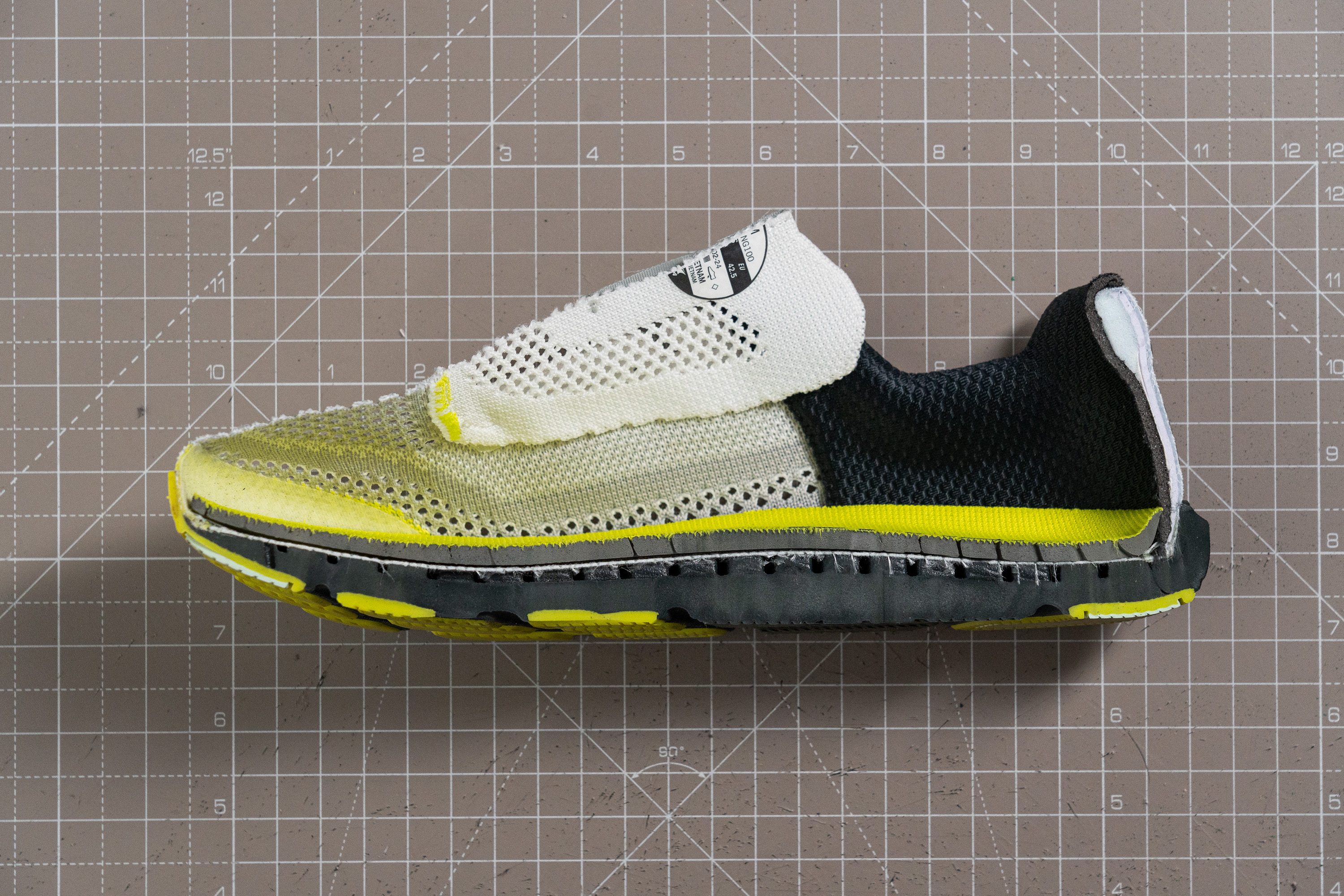
| Escalante Racer 2 | 1.1 mm |
| Average | 8.6 mm |
Midsole softness
We used our Shore A durometer to measure the midsole's softness, recording 28.3 HA, placing this EGO foam clearly on the firmer end of the spectrum.
However, it's important to note that using a plush foam in a low-stack shoe could lead to an uncomfortable ride, characterised by a noticeable "bottom out" feel in every stride.
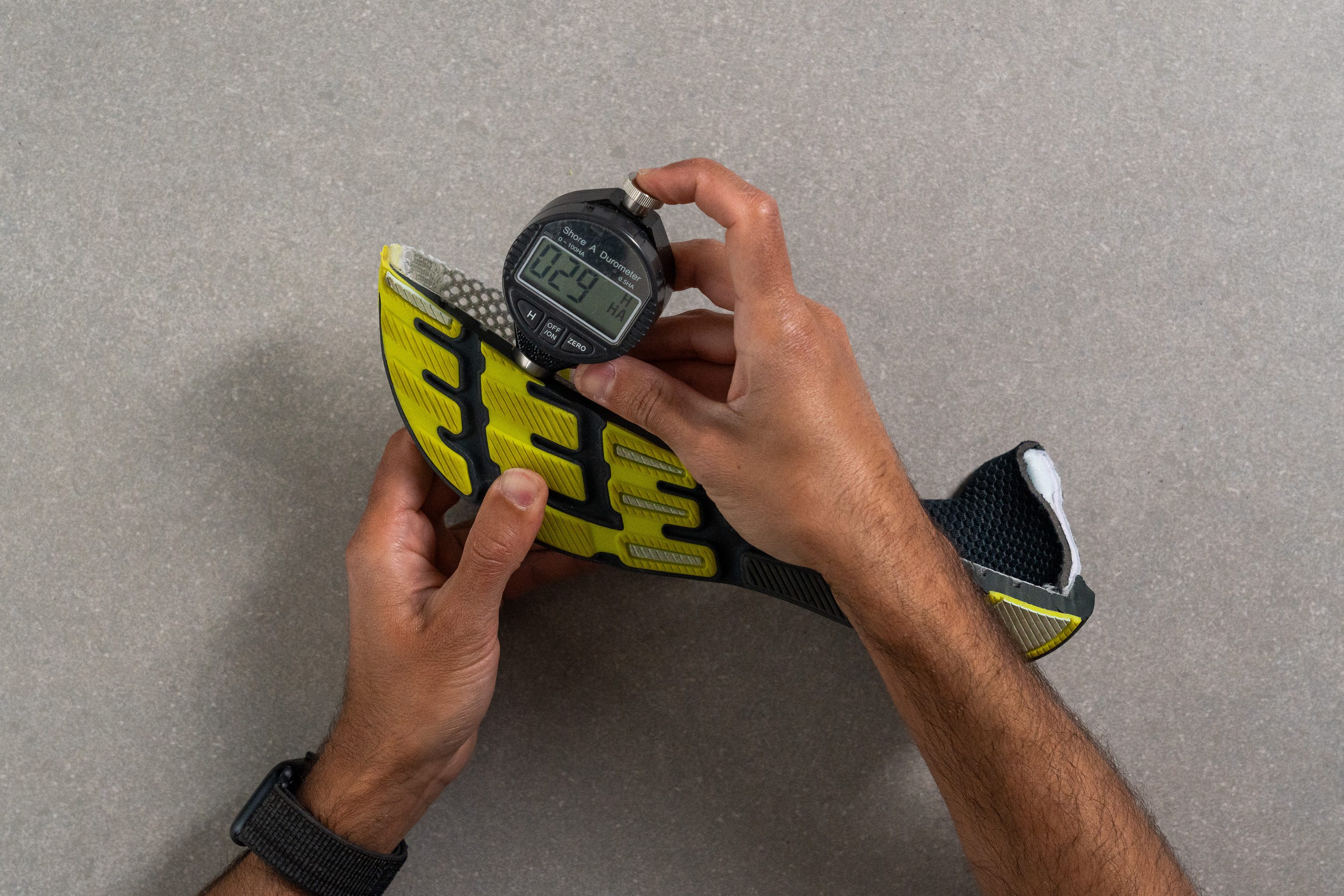
| Escalante Racer 2 | 28.3 HA |
| Average | 20.4 HA |
Rocker
A truly natural-running, zero-drop shoe designed should evoke the essence of old-school racing flats, steering clear of the more rockered, maximalist designs like the Hoka Cielo X1. Fortunately, as our video demonstrates, the Escalante Racer 2 remains faithful to its minimalist design.
Size and fit
Size
Altra Escalante Racer 2 fits true to size (35 votes).
Internal length
| Escalante Racer 2 | 270.0 mm |
| Average | 269.4 mm |
Width / Fit
As with every Altra, we had high hopes for the roominess of the upper, given that the Escalante Racer 2 features Altra's "Original FootShape"—the most generous, natural shoe design by the American brand.
Our measurements met our expectations: at a wiiiide 102.4 mm across the broadest part, it offers exceptional space.
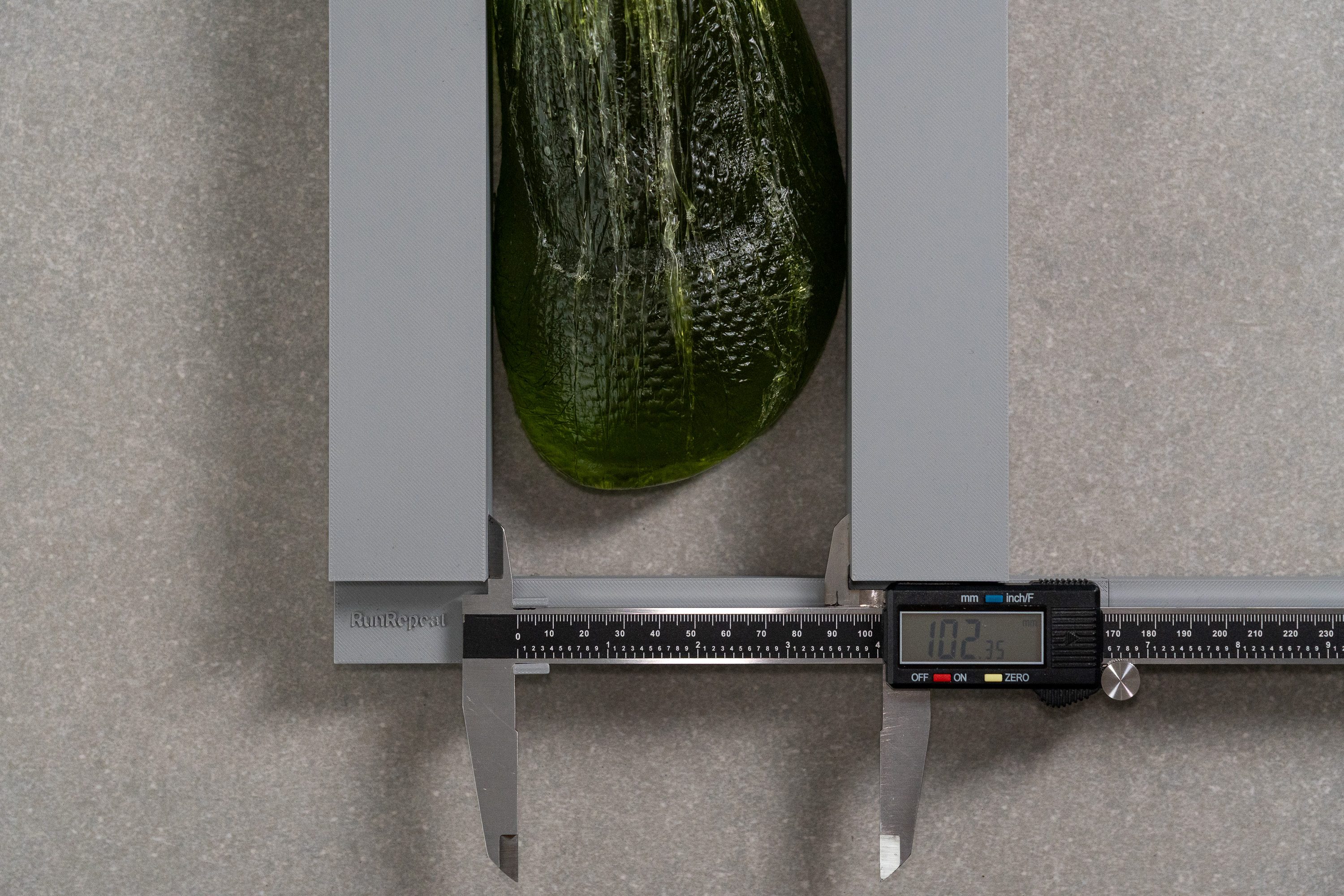
Altra's shoes might look weird, but they simply excel at allowing the toes to spread naturally.
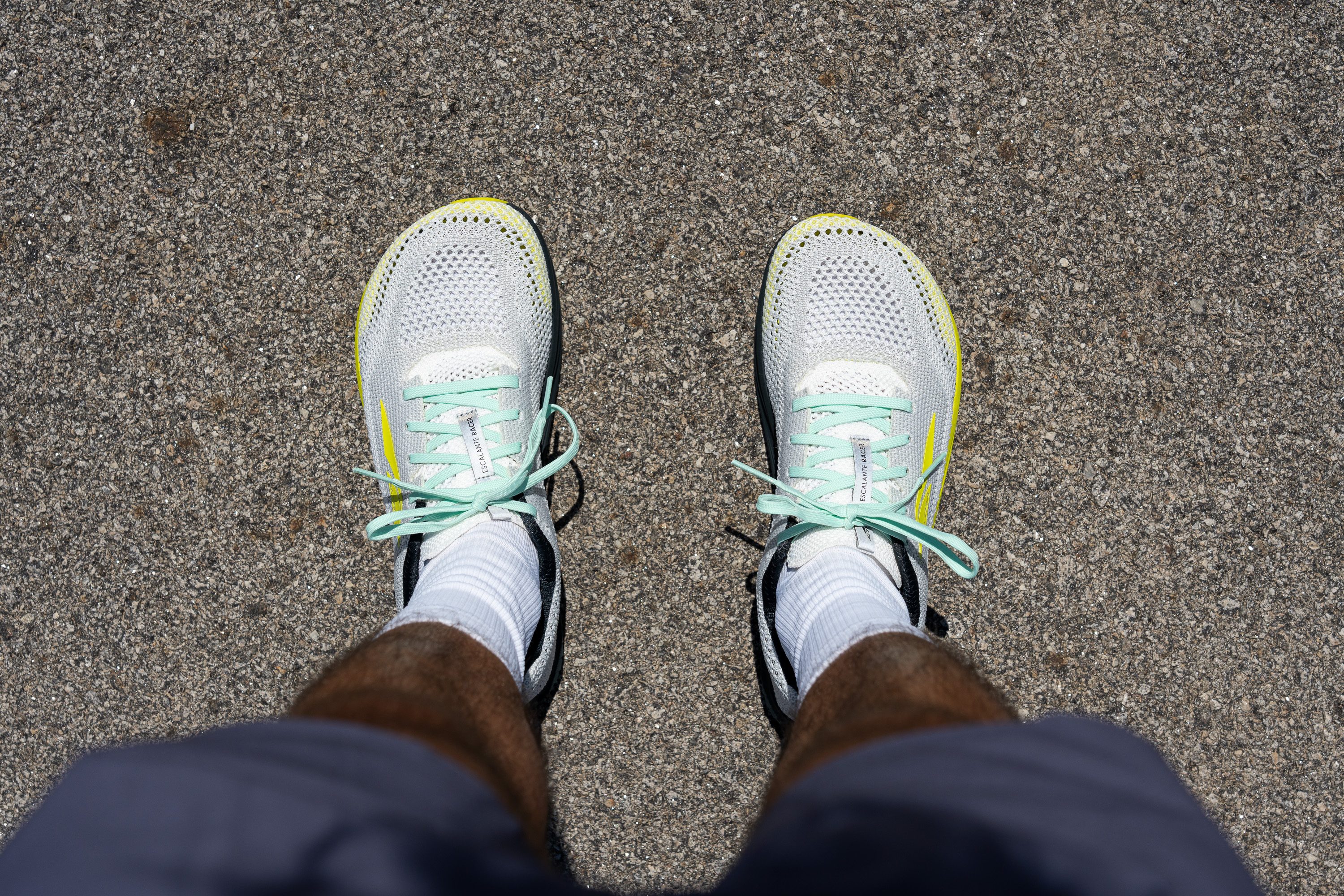
| Escalante Racer 2 | 102.4 mm |
| Average | 95.1 mm |
Toebox width
As usual with Altra, it’s our second measurement at the big toe that shows the real story. We found an impressive 83.3 mm here. Here's where the brand’s wide-and-natural FootShape design truly shines, offering a foot-friendly layout that allows toes to move freely without lateral pressure.
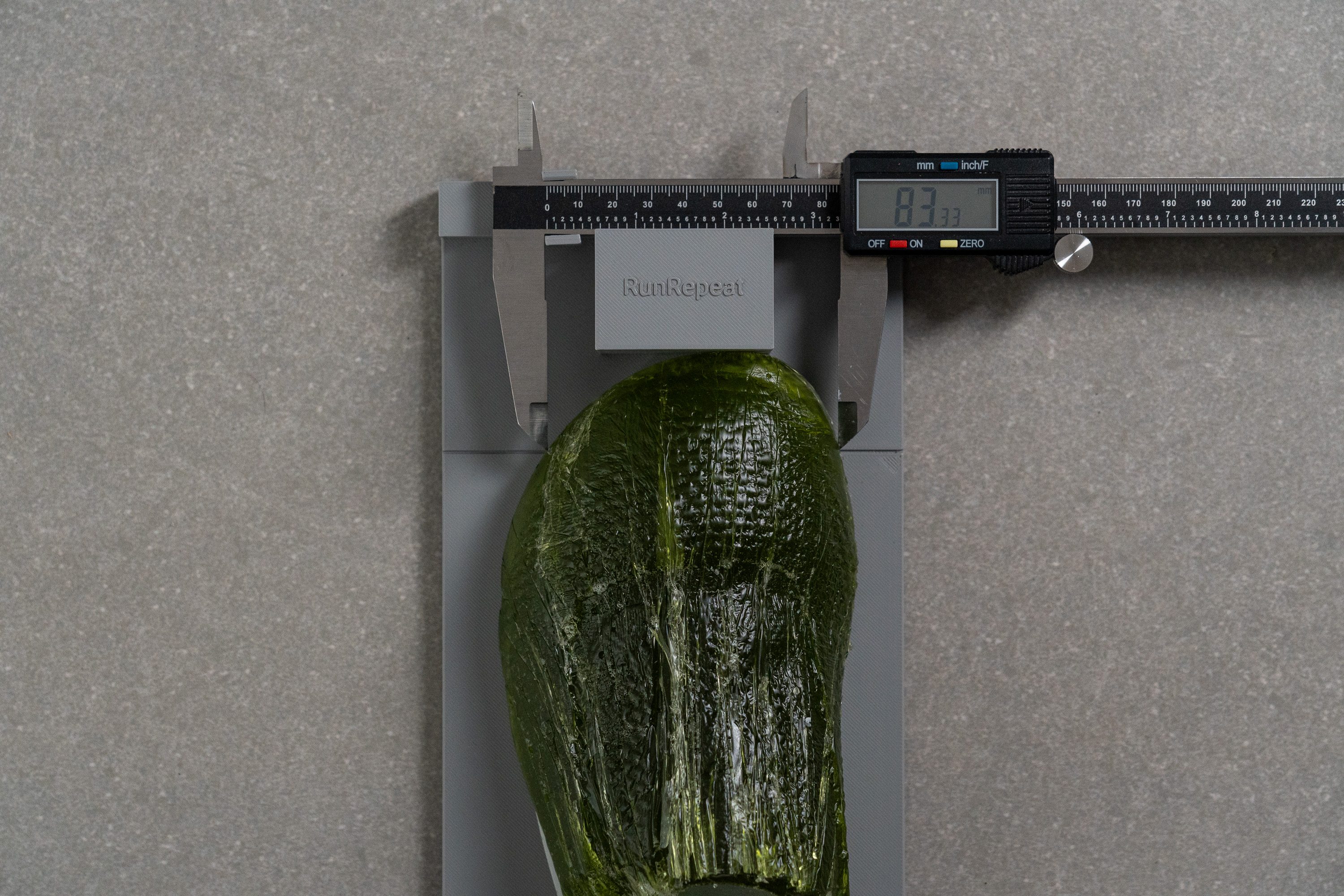
| Escalante Racer 2 | 83.3 mm |
| Average | 73.3 mm |
Toebox height
No matter what your foot shape is, you will find enough vertical space in the toebox of Escalante Racer 2.
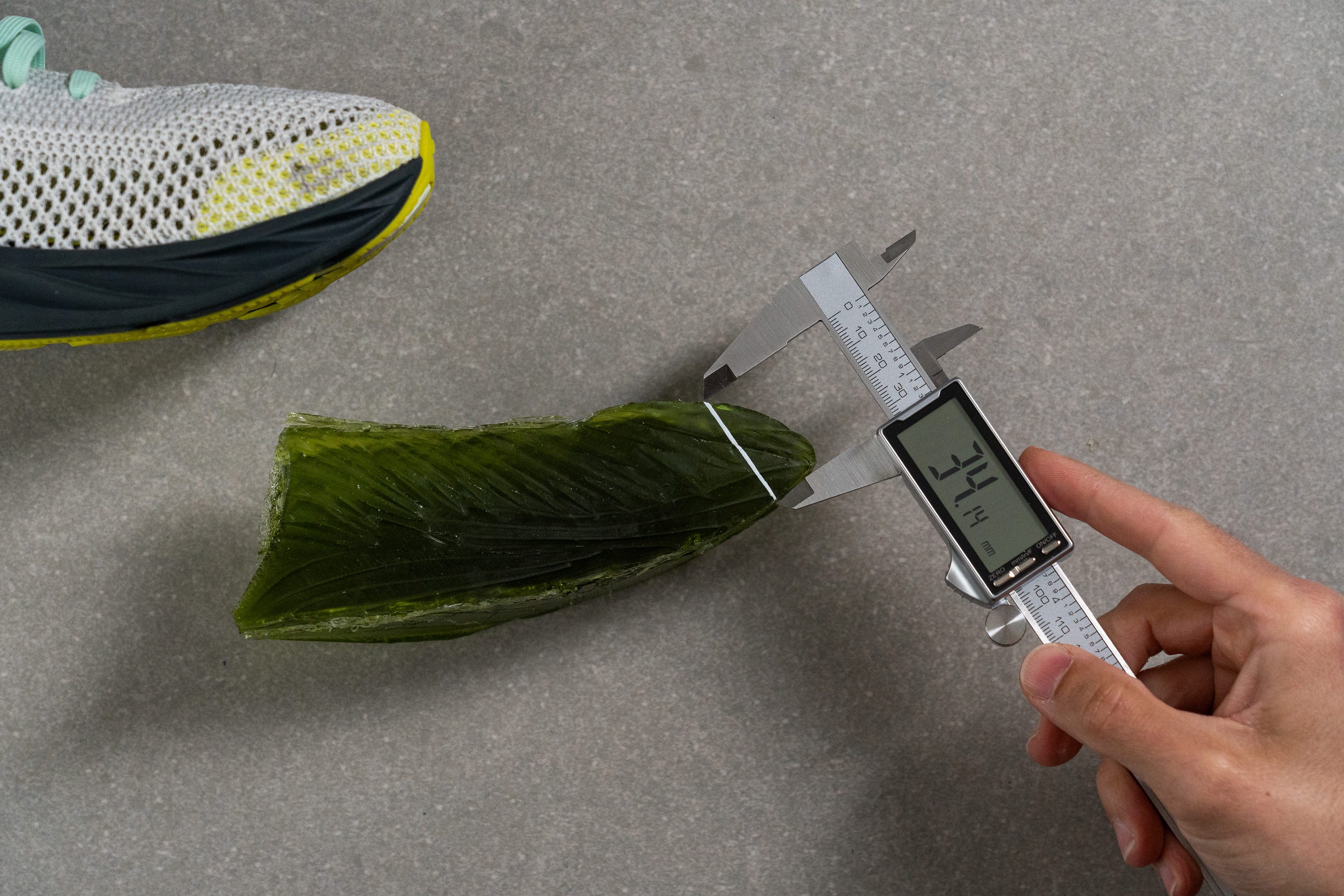
With its sizable toebox height of 34.1 mm and a stretchy knit upper material, fit should never be a problem in this Altra shoe.
| Escalante Racer 2 | 34.1 mm |
| Average | 27.0 mm |
Flexibility / Stiffness
Requiring just 15.0N in our classic 90-degree bend test, this is the ultimate demonstration of the Escalante Racer's minimalist and exceptionally flexible design.
This test follows an older methodology, which is why you don't see recently tested shoes in the chart. Results from different methodologies can not be compared.
| Escalante Racer 2 | 15.0N |
| Average | 28.1N |
Stiffness in cold (%)
Following a 20-minute nap in the freezer, we re-evaluated the stiffness of the Escalante Racer 2 with our force gauge. This time, the ER2 was 34.3% stiffer.
| Escalante Racer 2 | 34% |
| Average | 33% |
Weight
While the outsole durability marks a significant improvement from its predecessor, we now face a disappointing setback.
Weighing in at 7.9 oz or 224g, the Escalante Racer 2 has unfortunately gained some unwanted weight. Although it remains relatively lightweight, for a shoe branded as a "racer" and featuring such a low-stack midsole, we think it needs to weigh a bit less to meet expectations!
| Escalante Racer 2 | 7.9 oz (224g) |
| Average | 9.3 oz (264g) |
Breathability
We've evaluated hundreds of running shoe uppers in our lab, so predicting their breathability has almost become an interesting challenge here before we even start testing with smoke. Yet, with the Escalante Racer 2, it was immediately apparent that a top score was inevitable.
Still, we needed to confirm our initial impression. As shown in our video above, there were no surprises—we awarded it a stellar 5/5, delighting those in search of a breathable upper in a zero-drop shoe.
We also wanted to verify whether this breathability extended beyond the toebox, as is often the case with other shoes. Fortunately, it provides consistent airflow from the toecap through the midfoot.
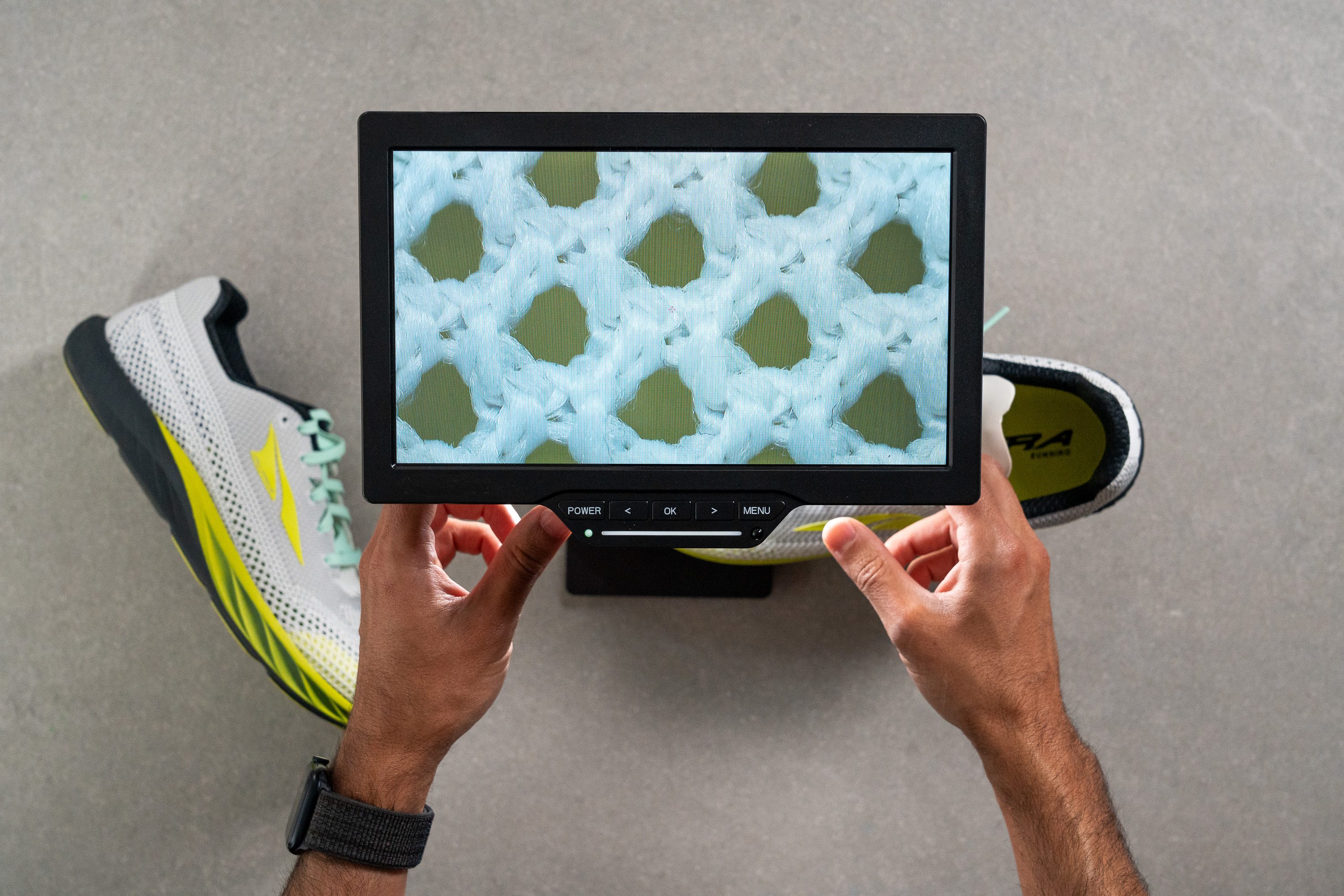
Having completed these initial tests, we then examined the engineered knit Altra selected for this shoe under the microscope. The ventilation holes were impressive at first glance and absolutely astonishing under magnification. Wow!
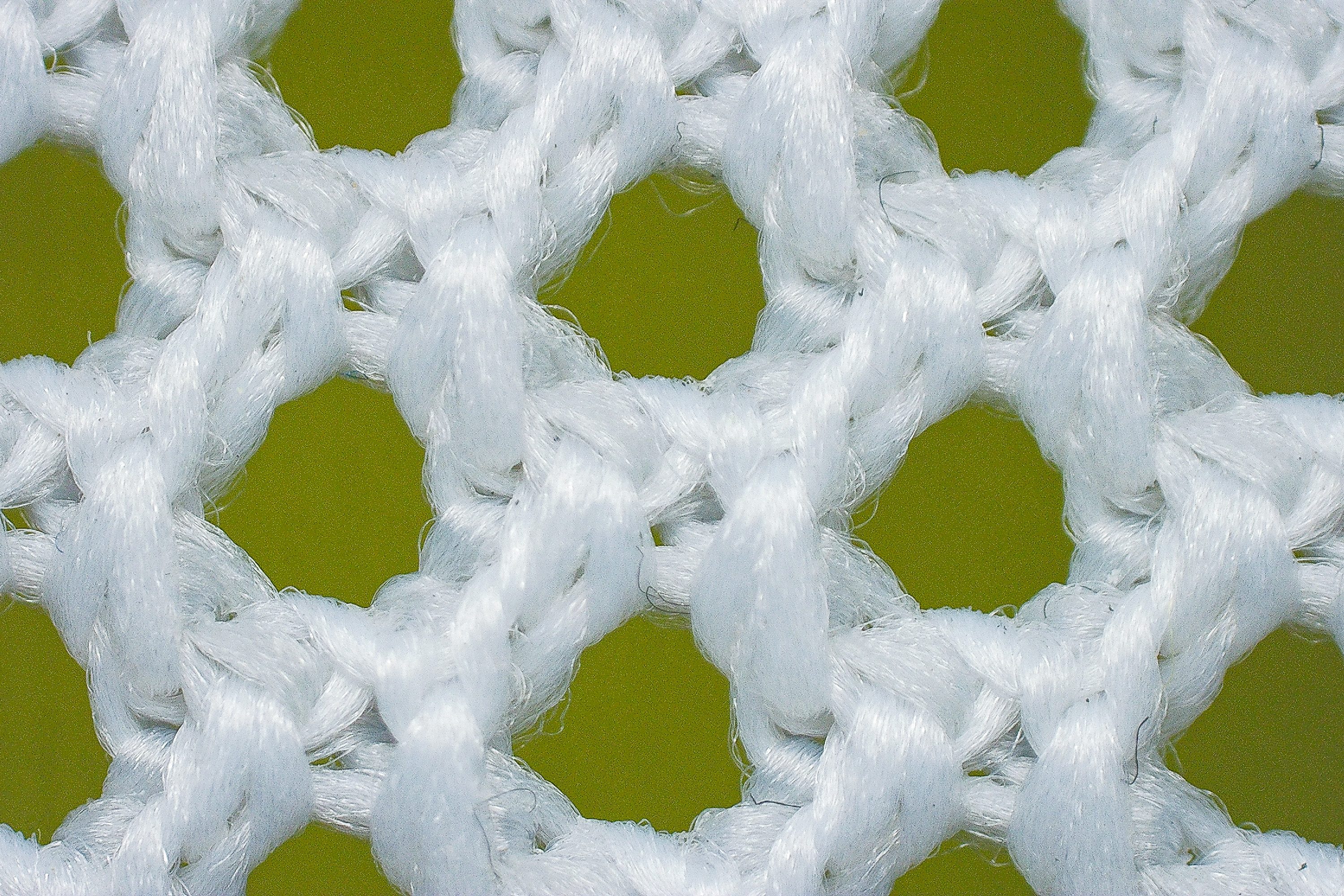
In summary, the Escalante Racer 2 features an exceptionally well-ventilated upper, perfect for warm conditions, though we suggest pairing it with thick, winter-ready socks if used in colder weather.
| Escalante Racer 2 | 5 |
| Average | 3.7 |
Stability
Lateral stability test
When compared to almost any other running shoe, the Escalante Racer 2 reduces the distance between your feet and the ground, providing exceptional stability for virtually everyone.
We discovered that it also offers this stable feel at all speeds, delivering a smooth, classic and unobtrusive running experience without any stiffening agents or big sidewalls.
Torsional rigidity
If you remember, we discussed the INNERFLEX design that Altra uses to make the outsole really flexible. Here, we confirmed its effectiveness and awarded the ER2 an impressive 1/5!
| Escalante Racer 2 | 1 |
| Average | 3.5 |
Heel counter stiffness
The heel counter is subtle and unobtrusive—far from being stiff. It barely offered any resistance under mild pressure, leading us to give it a rating of 2 out of 5.
| Escalante Racer 2 | 2 |
| Average | 2.9 |
Midsole width - forefoot
With Altra's commitment to its foot-shaped design, we anticipated a really wide measurement in the forefoot and a narrower one in the heel—just as one might expect from looking at their own feet.
Indeed, our initial measurement came in at a substantial 118.4 mm, confirming our sensation of enhanced stability when running with a midfoot and forefoot-striking technique.
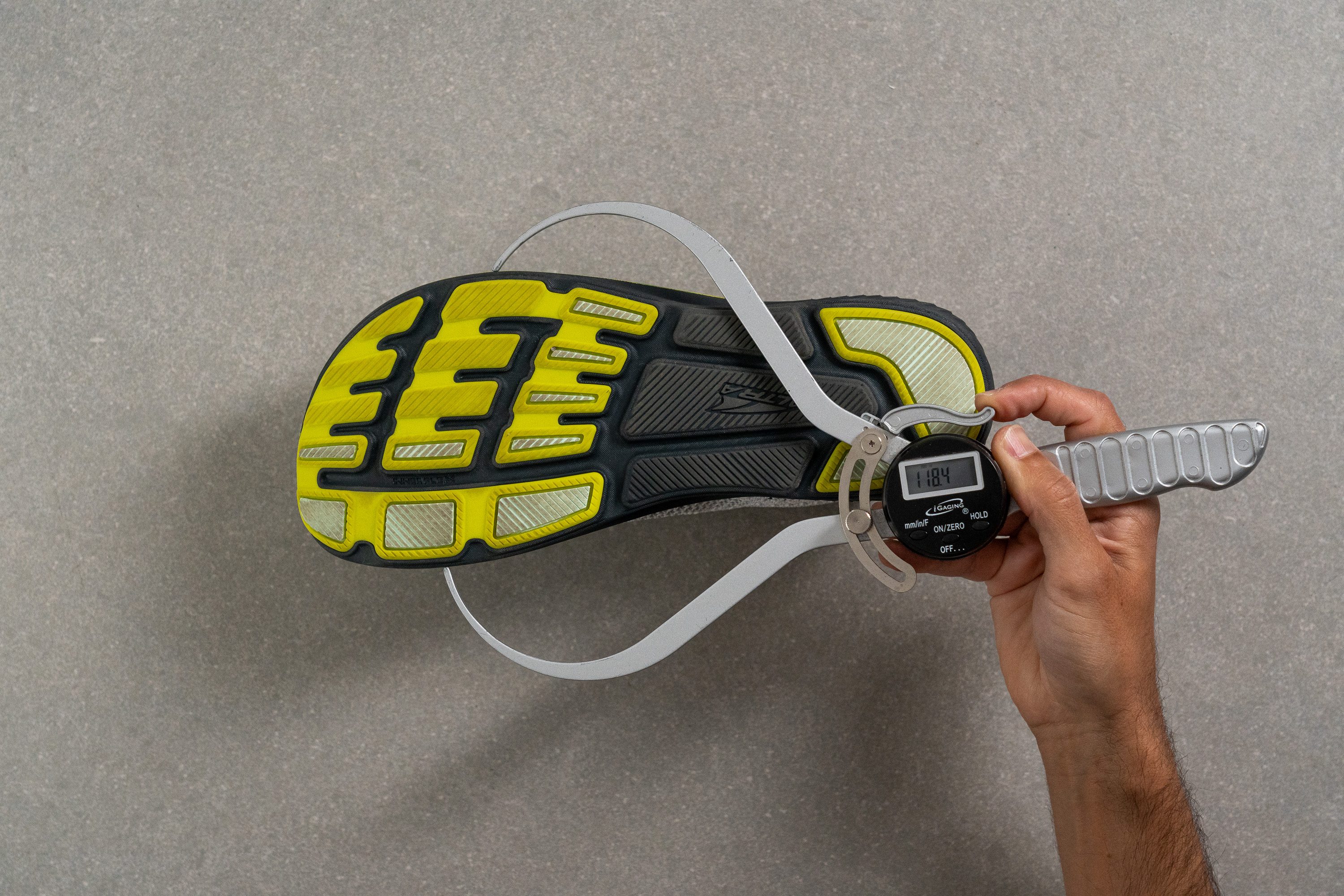
| Escalante Racer 2 | 118.4 mm |
| Average | 114.4 mm |
Midsole width - heel
After measuring the forefoot, we moved to the heel, where our anticipation of a narrower profile was confirmed. With a width of just 83.3 mm, it’s clear evidence that this zero-drop shoe is not suited for rearfoot strikers.
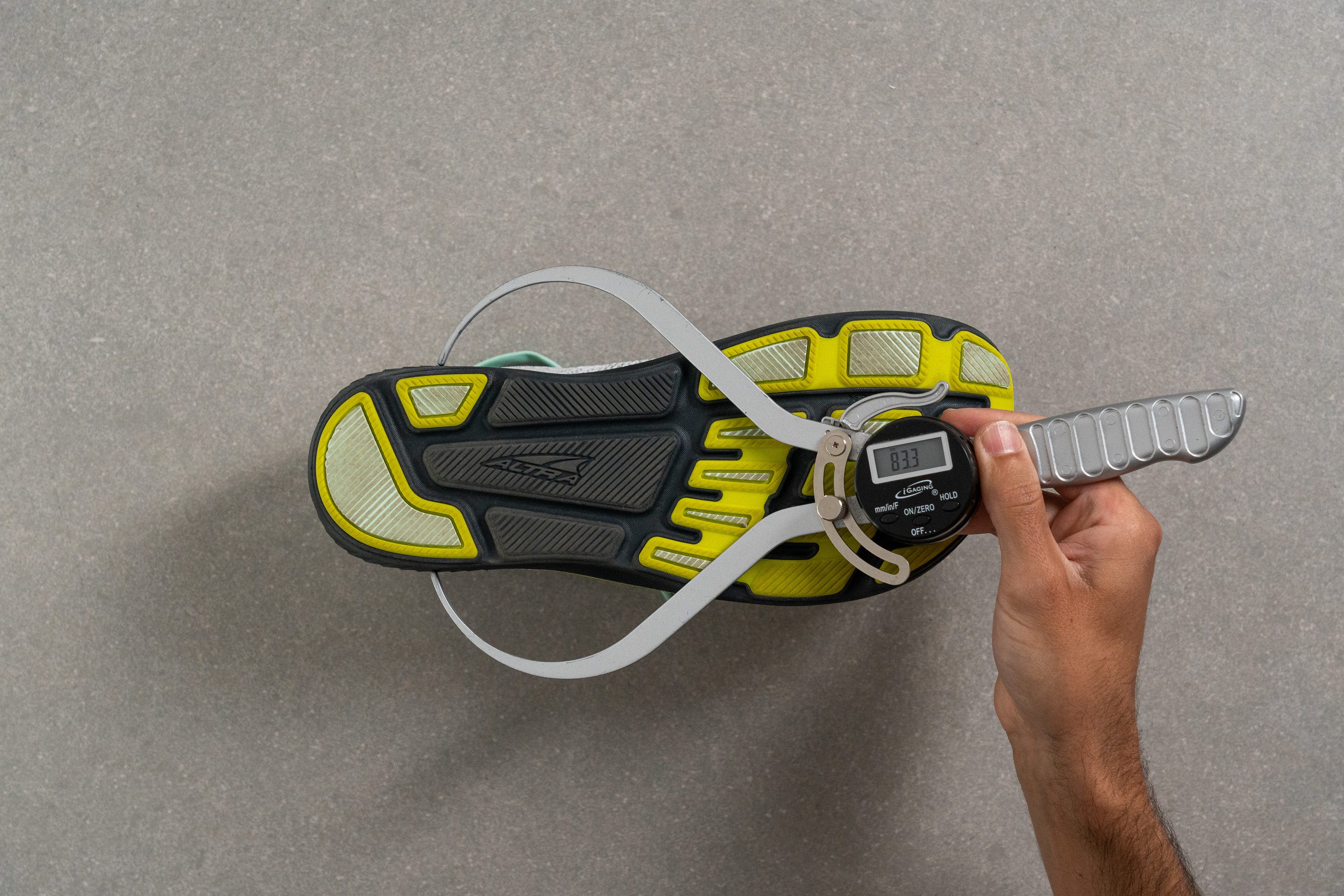
| Escalante Racer 2 | 83.3 mm |
| Average | 90.6 mm |
Durability
Toebox durability
While we often accurately predict the breathability score before testing here in the lab, guessing durability before the Dremel test always proves waaay more challenging. Sometimes, uppers that seem delicate surprisingly deliver remarkable performances, and vice versa.
This was one of those rare cases where an airy, knit upper resisted the Dremel with ease. It performed so well that we awarded it a 4/5, which is particularly impressive given the size of the ventilation holes. Truly amazing.
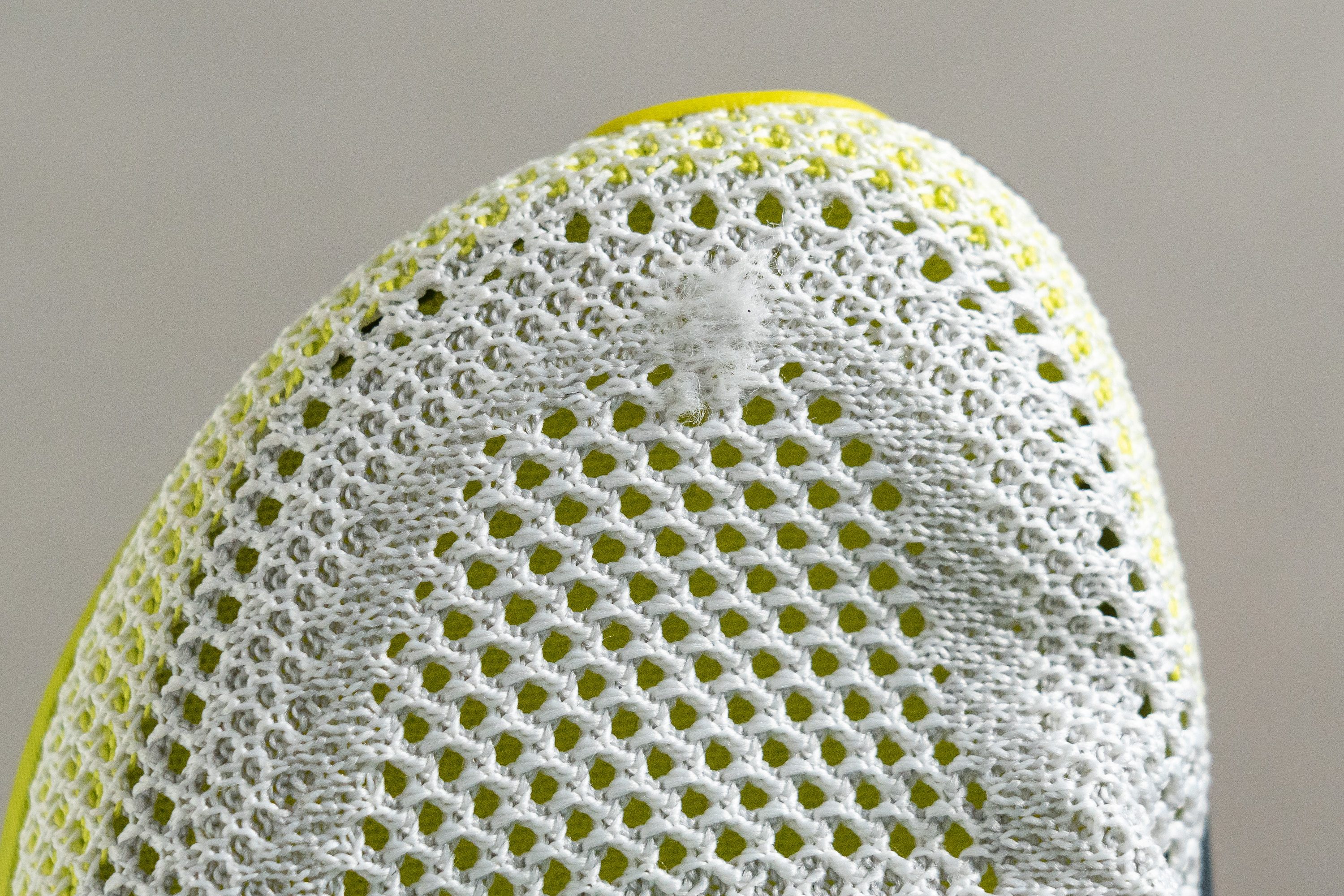
| Escalante Racer 2 | 4 |
| Average | 2.6 |
Heel padding durability
In most running shoes, the heel padding typically outlasts the toebox, a trend that is clear from the averages in our tests.
However, the Escalante Racer 2 consistently delivered unexpected results, and here we discovered a particularly disappointing one—a rating of 2/5 that raised our eyebrows.
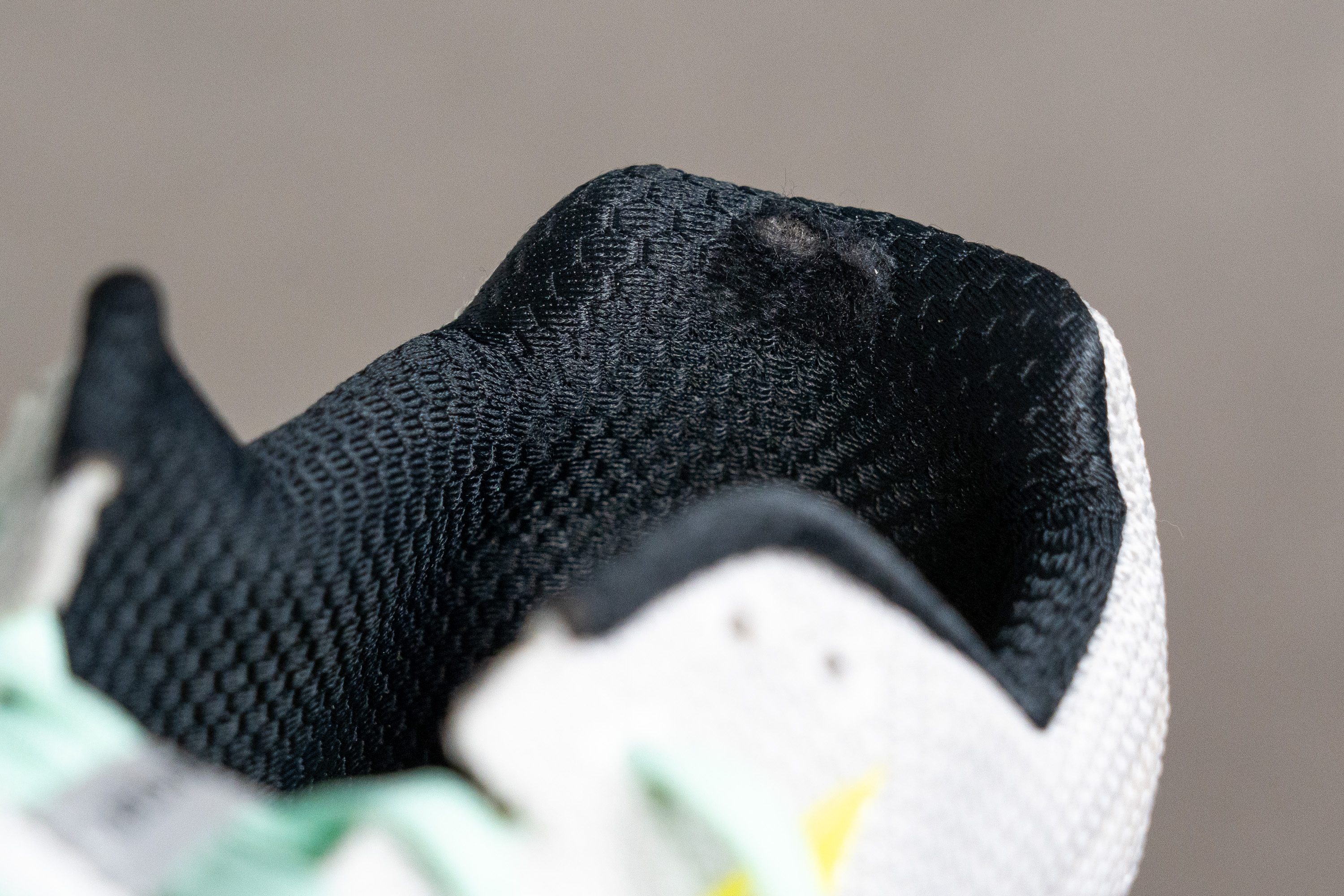
| Escalante Racer 2 | 2 |
| Average | 3.4 |
Outsole hardness
We found again the FootPod Outsole design, which mirrors the natural anatomy of the human foot for an authentic ride. In terms of flexibility, we discovered multiple lateral and longitudinal grooves aligning with the flex points of the joints, named by Altra as INNERFLEX.
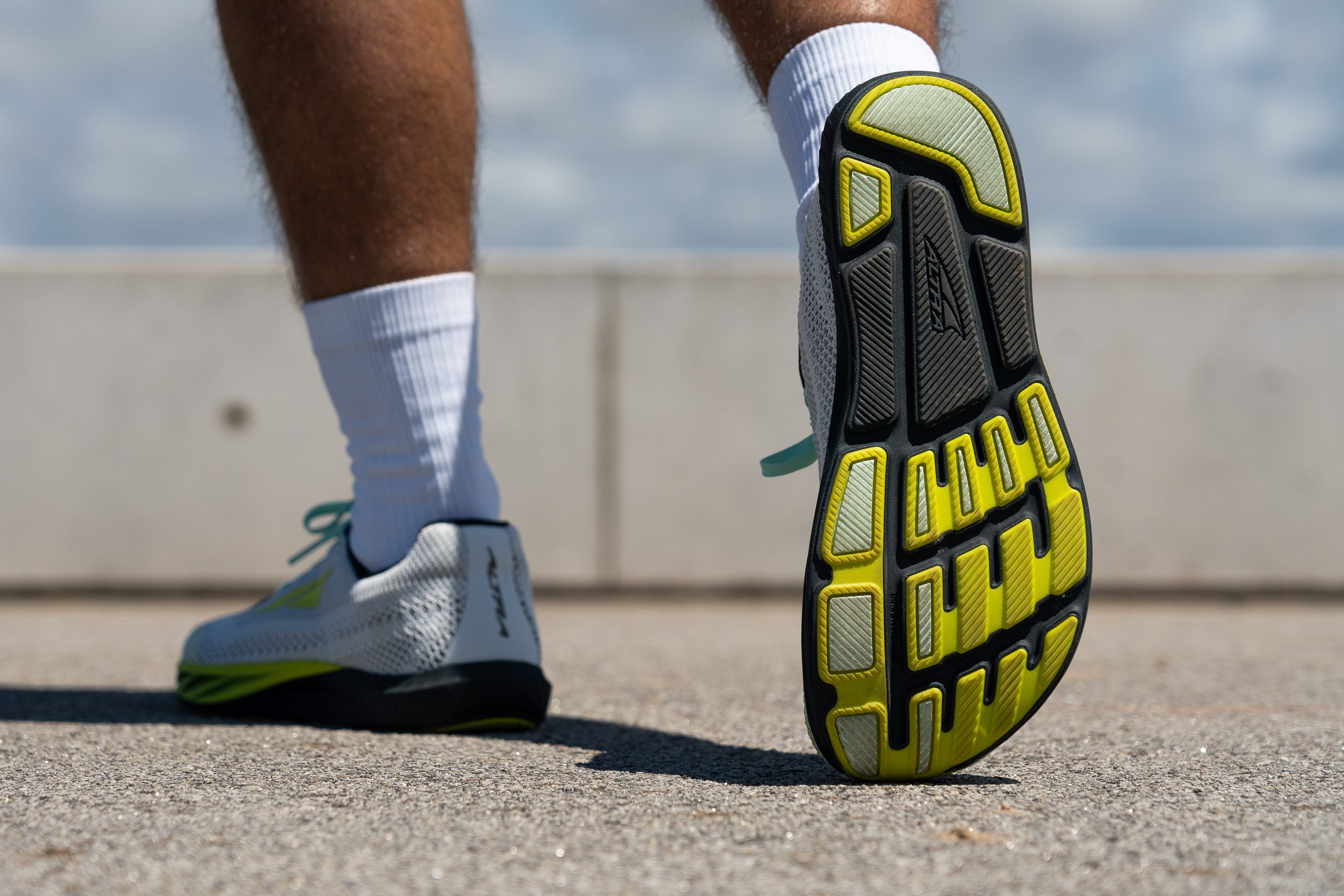
Our durometer tests measured the outsole hardness at a robust 86.2 HC, which is in the higher end of the spectrum.
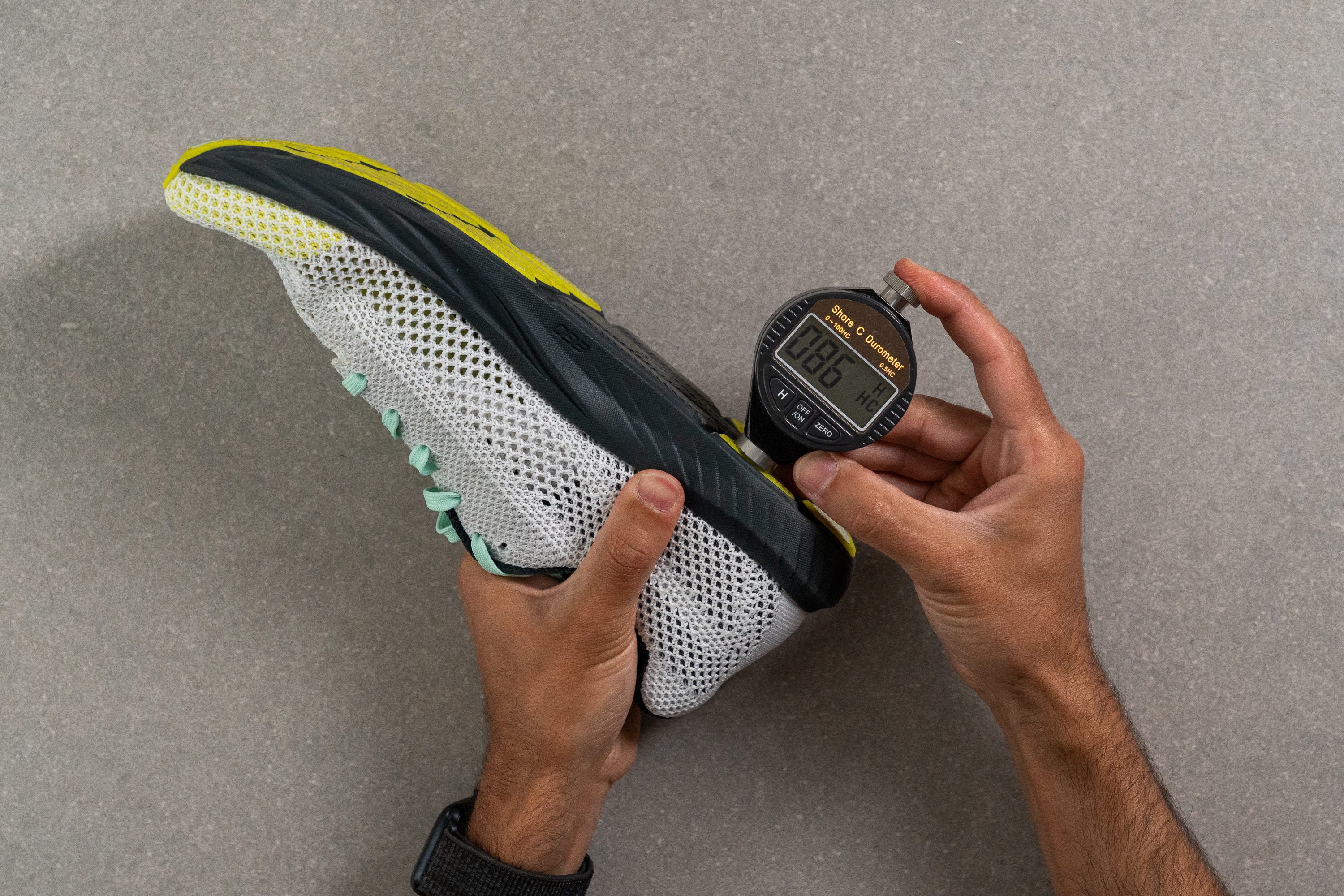
| Escalante Racer 2 | 86.1 HC |
| Average | 79.2 HC |
Outsole durability
We were particularly impressed with this outsole after our third Dremel test, as we only observed a 0.3 mm indentation.
This is arguably the most significant and eagerly awaited upgrade from the previous version of the Escalante Racer, which had outsole durability as one of its weaknesses.
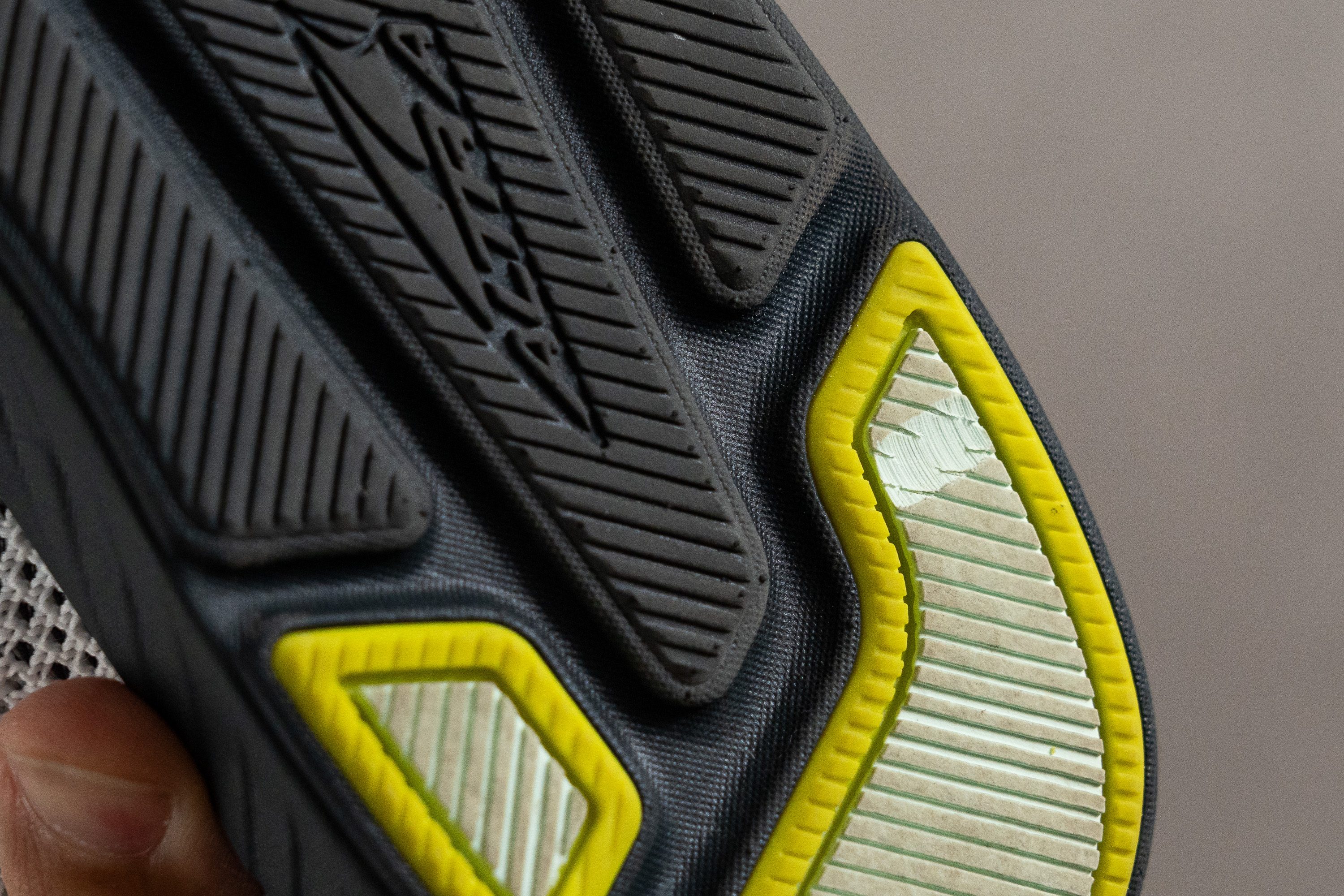
| Escalante Racer 2 | 0.3 mm |
| Average | 1.1 mm |
Outsole thickness
We also think that the 4.6 mm thickness might be more than necessary and suggest that Altra could improve the weight of the shoe by slightly thinning the outsole. It's also worth noting that we found the same approach as in recent minimalist shoes by this brand—embedding the outsole within the foam instead of merely glueing it on top. That's a nice touch.
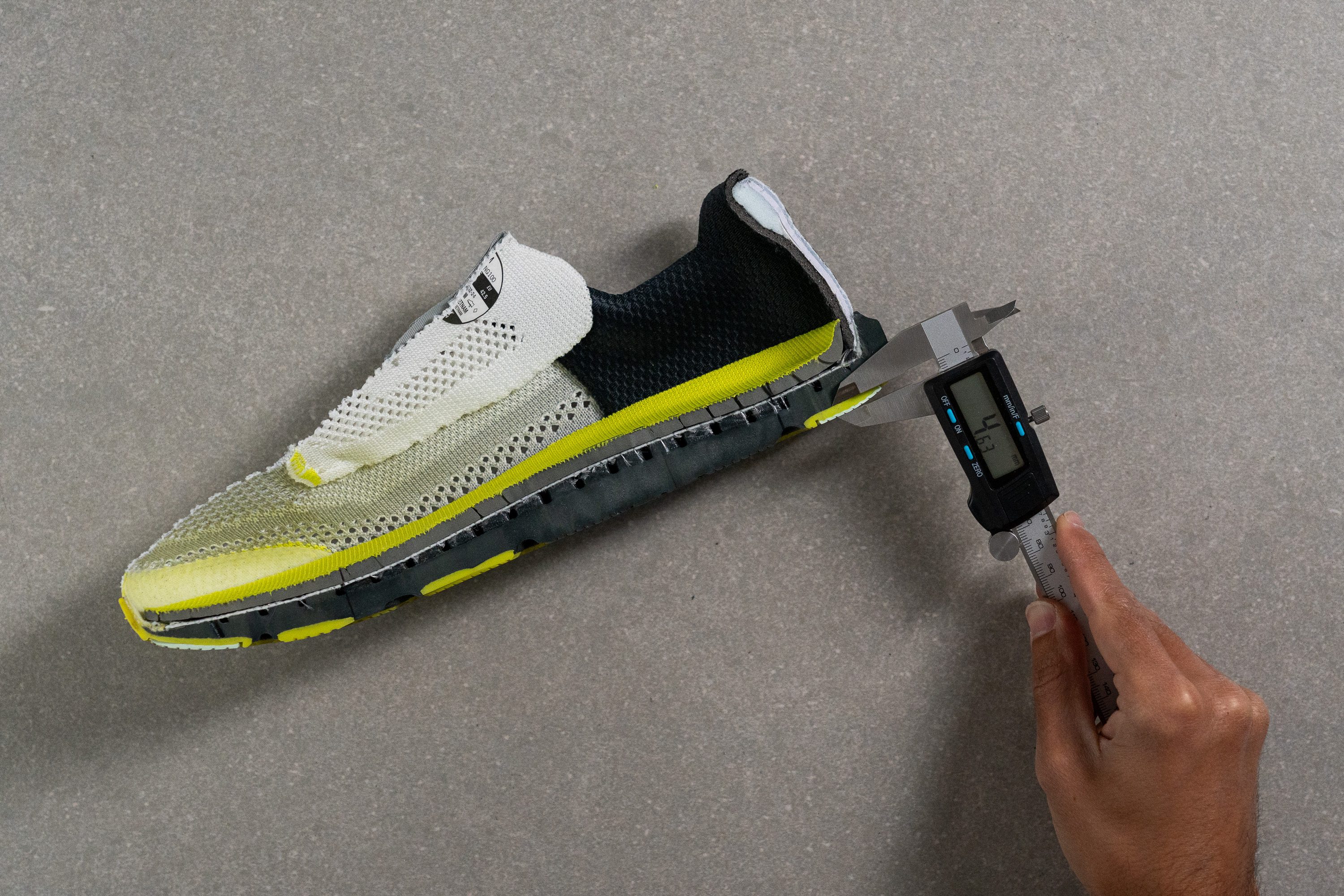
| Escalante Racer 2 | 4.6 mm |
| Average | 3.2 mm |
Misc
Insole thickness
The insole boasts a substantial cushioning of 5.4 mm.
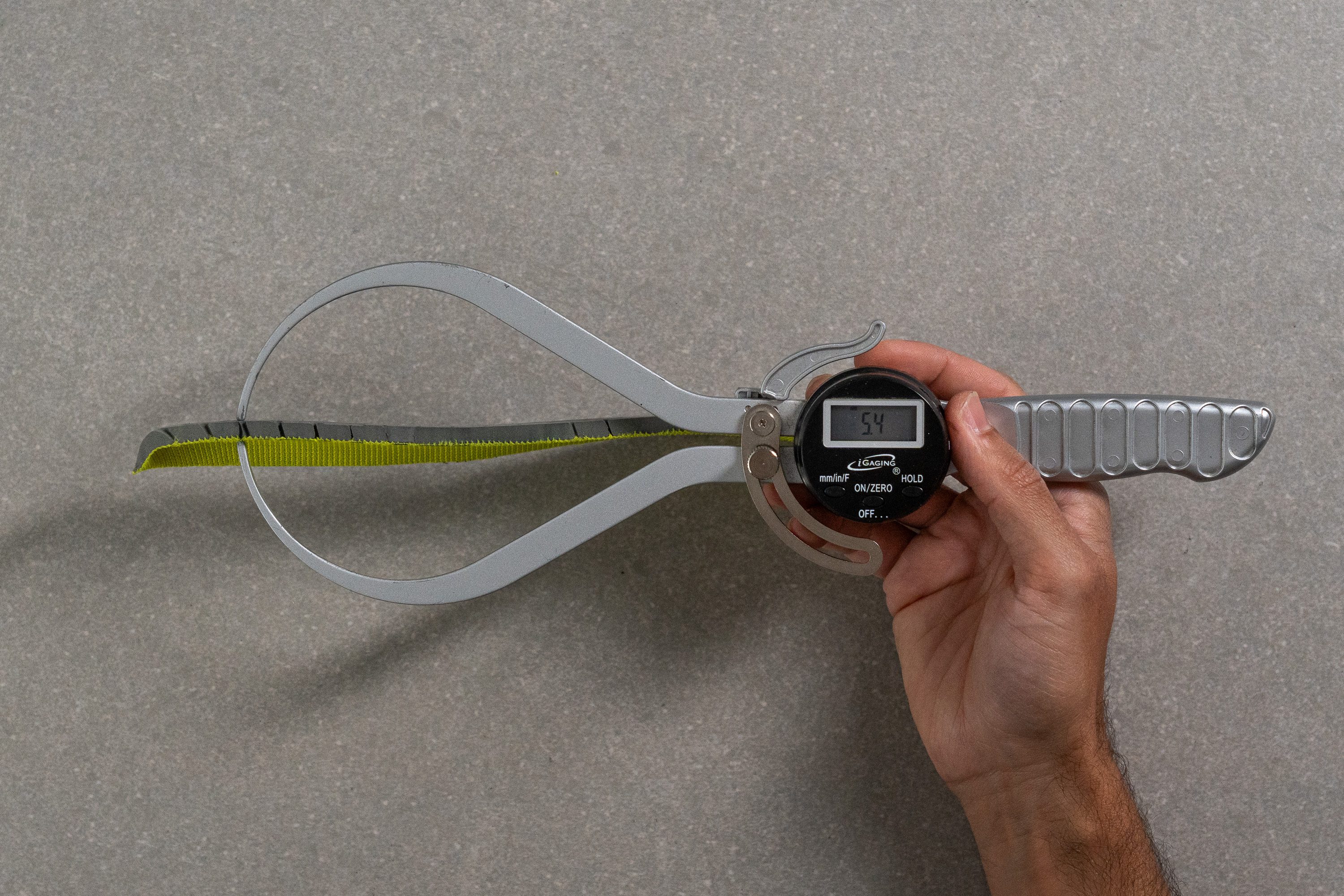
| Escalante Racer 2 | 5.4 mm |
| Average | 4.5 mm |
Removable insole
Despite being removable, we suggest retaining the original insole as it's a premium one with perforations, which significantly boosts airflow within the shoe.
Additionally, with its unique FootShape toe design, we think it might make it challenging to fit an alternative.
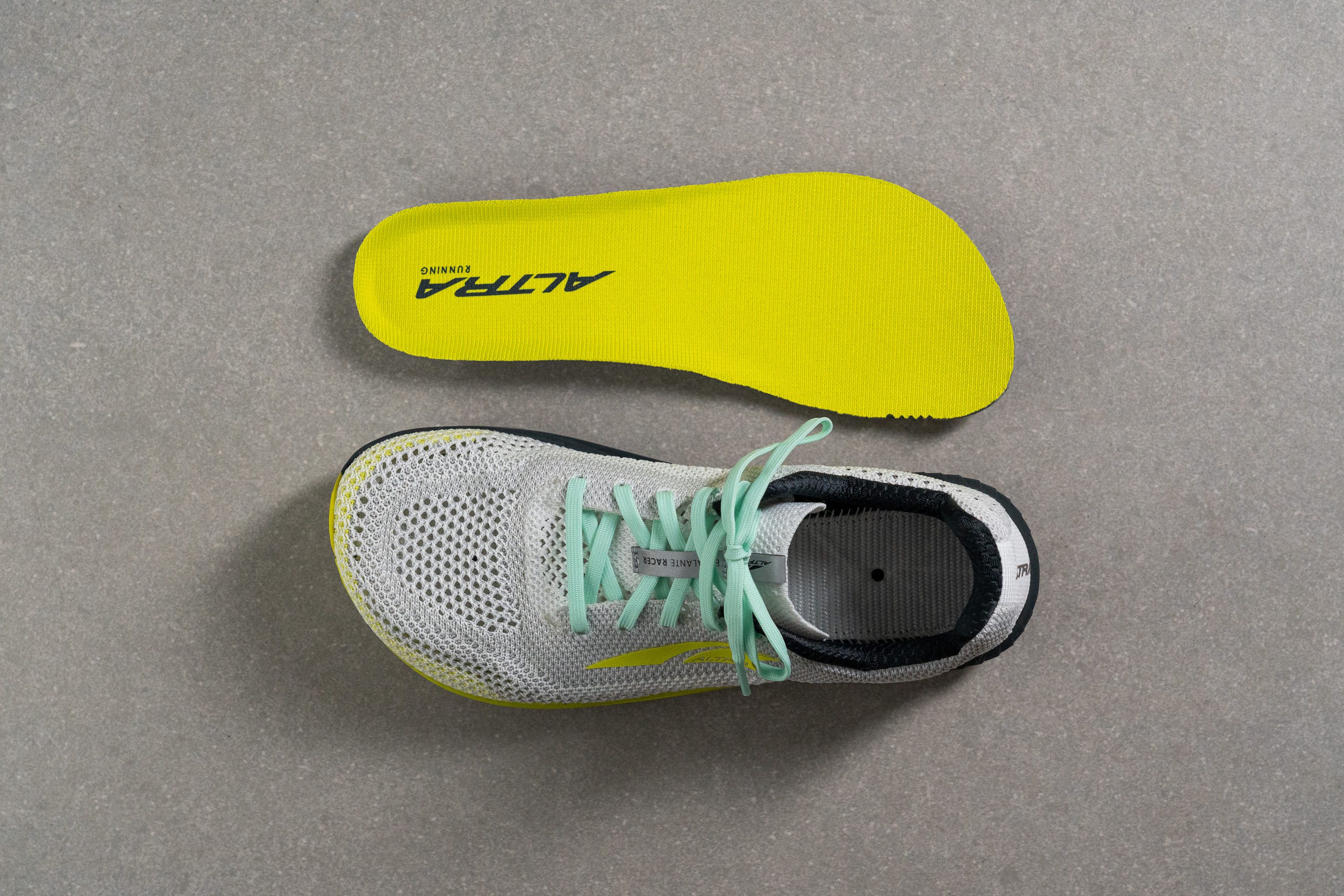
| Escalante Racer 2 | Yes |
Midsole softness in cold (%)
After enduring 20 minutes in our freezer, the EGO foam went north by 31%. That's not the best performance ever seen in the lab, but it's also what we expect from an EVA-based material.
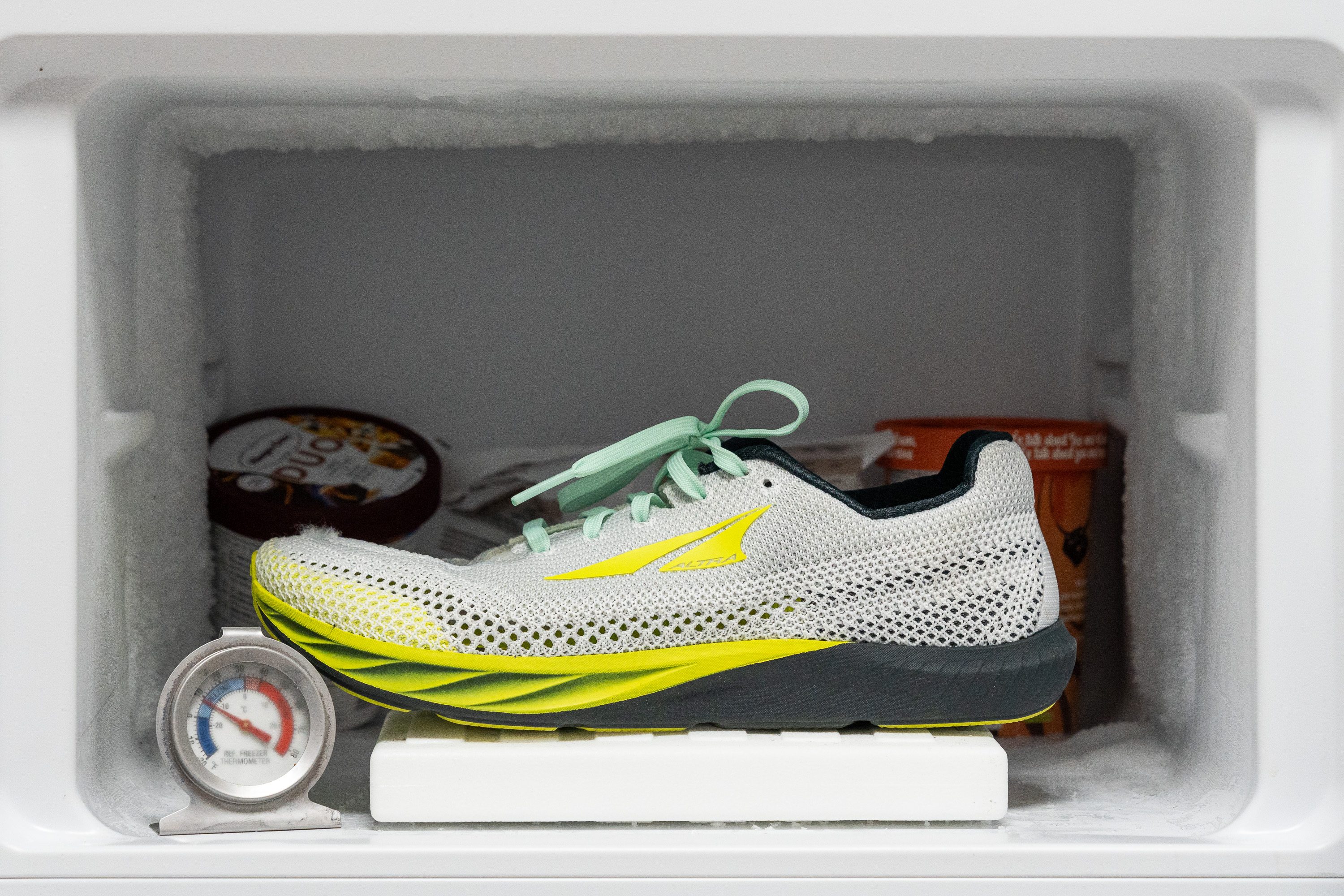
| Escalante Racer 2 | 31% |
| Average | 24% |
Reflective elements
The Escalante Racer 2 retains the brilliant reflective elements in the tongue from its predecessor, a decision we consider exceptionally smart—they truly stand out!
| Escalante Racer 2 | Yes |
Tongue padding
The Escalante Racer 4's tongue lives up to its racing name, featuring a minimal 1.5 mm padding that provides very little protection across the whole instep.
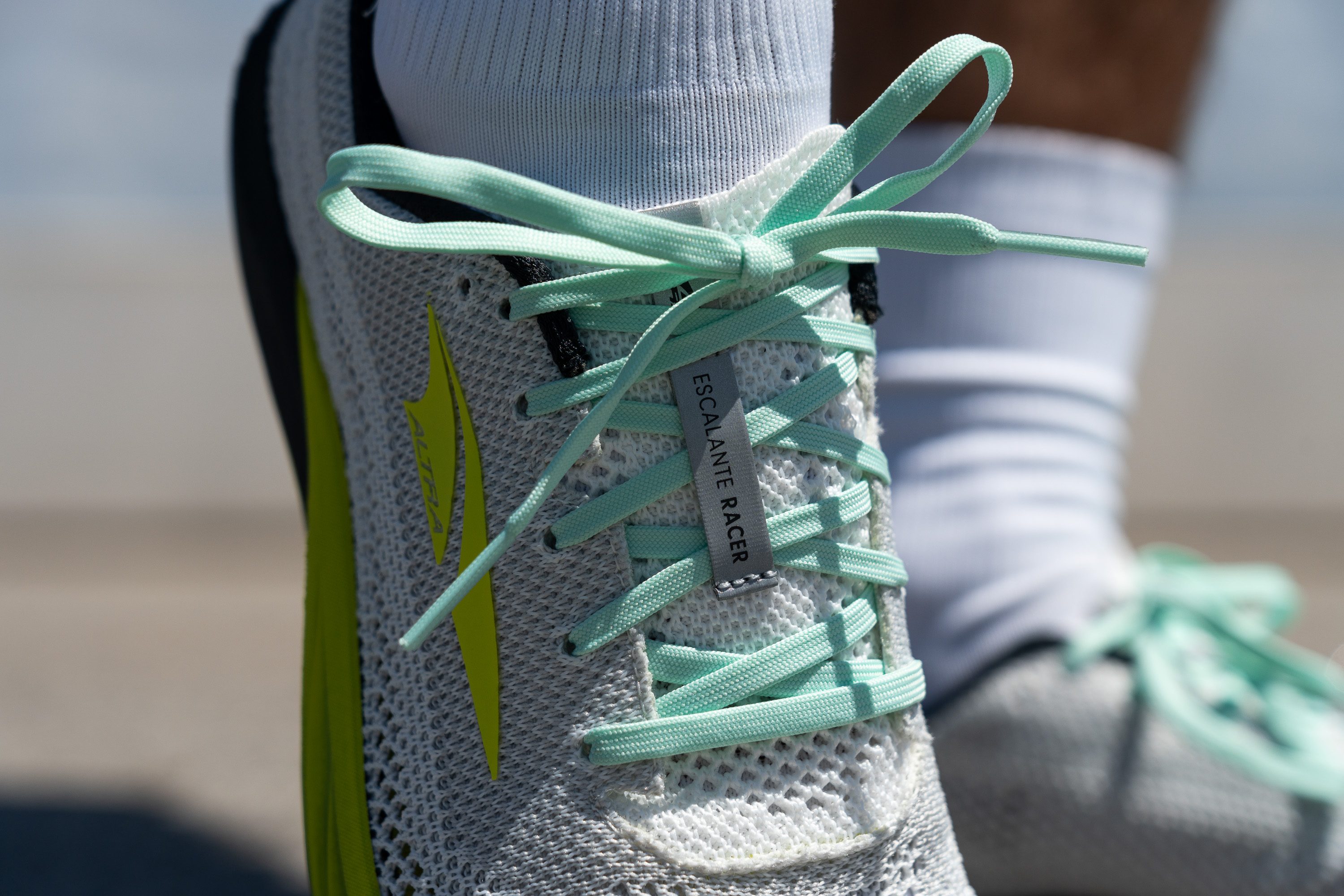
Due to its thin cushioning, we recommend not tightening the laces too firmly to avoid lace bite.
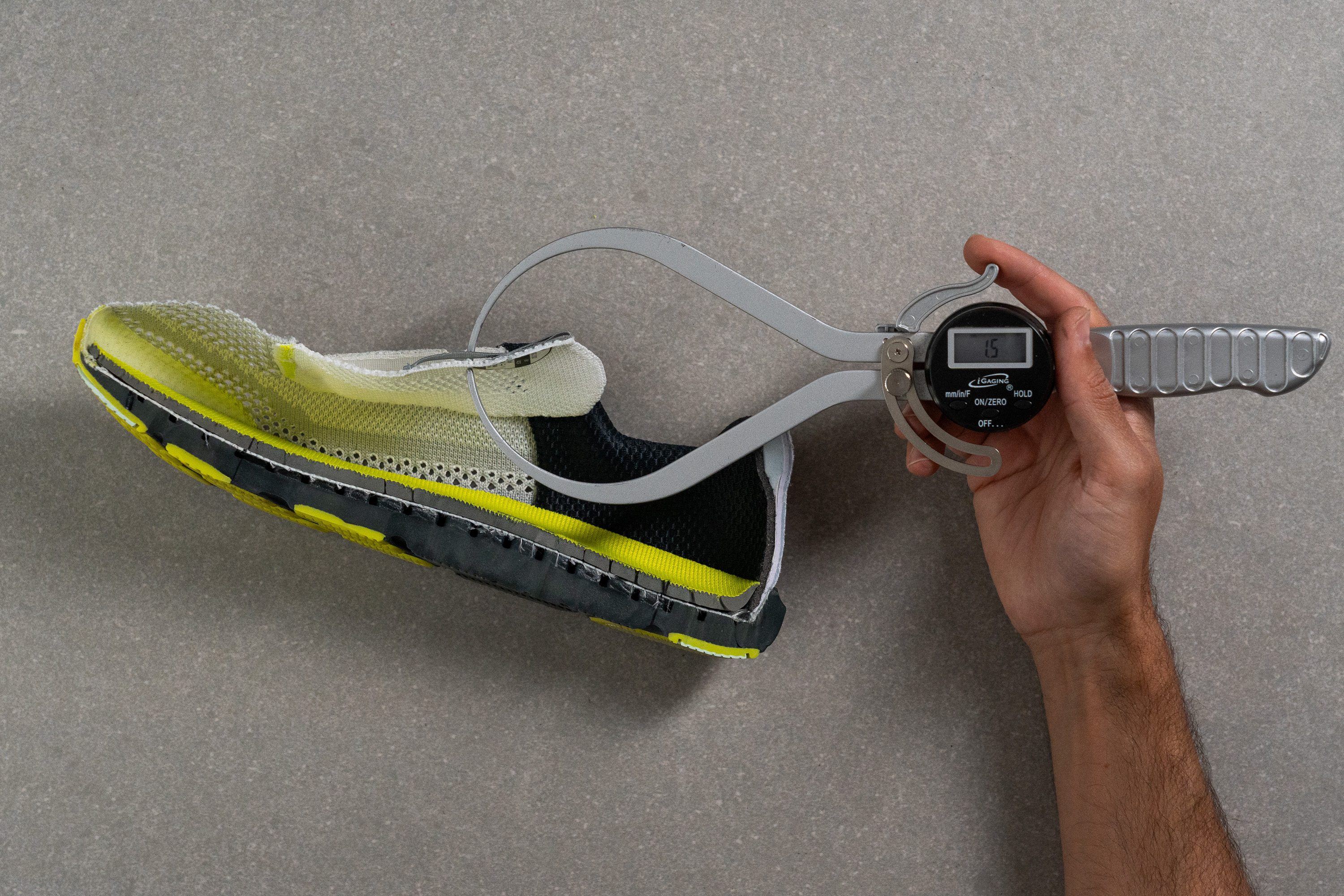
| Escalante Racer 2 | 1.5 mm |
| Average | 5.7 mm |
Tongue: gusset type
Regrettably, the Escalante Racer 2's tongue is (again) not gusseted, which lets it move around during fast runs. Incorporating at least a semi-gusseted design would greatly enhance its fit, and we think it's a feature well deserved in a £140 shoe.
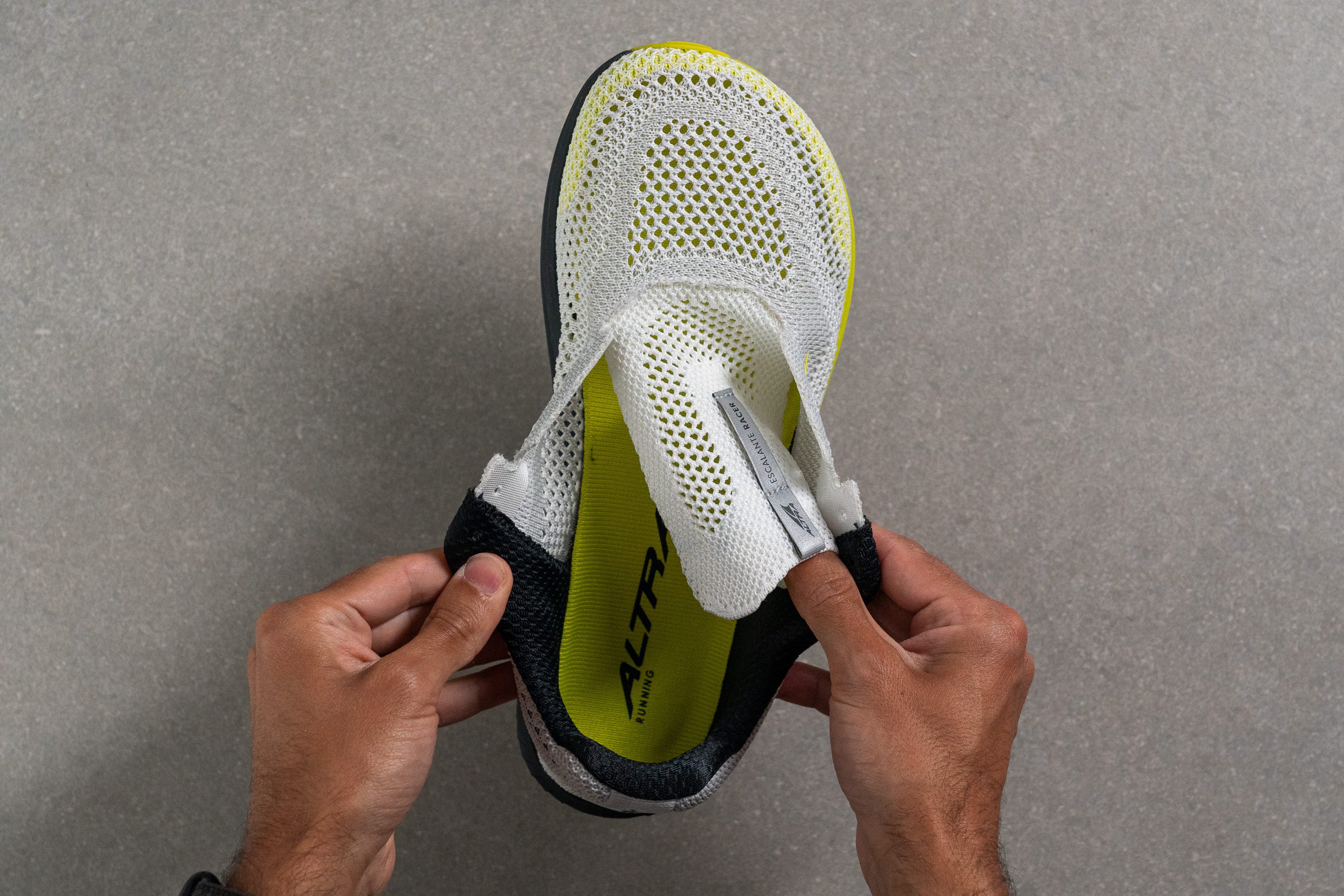
| Escalante Racer 2 | None |
Heel tab
We discovered that Altra chose to maintain the design elements from the previous version, so, like before, there's no heel tab on this model either.
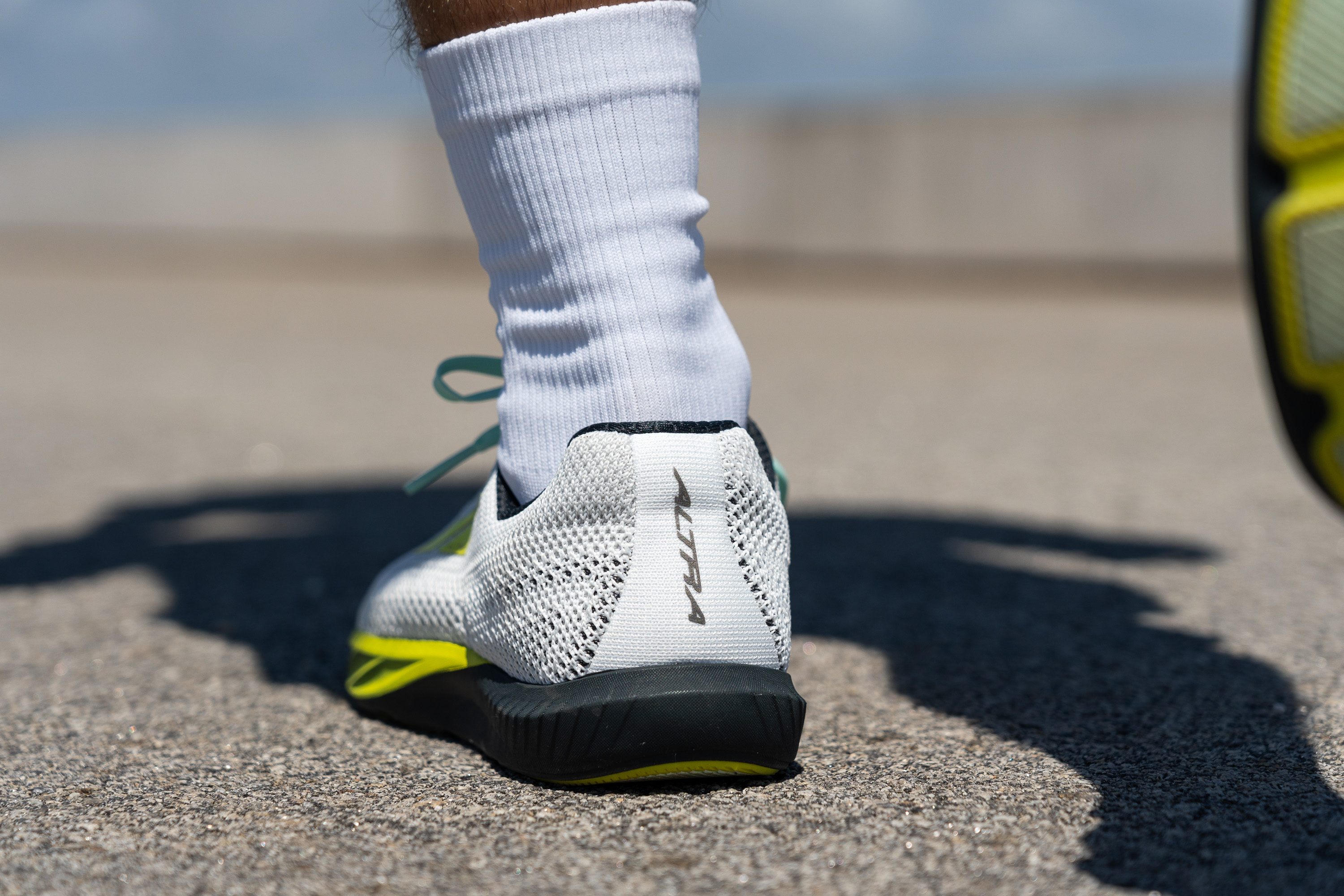
| Escalante Racer 2 | None |

